Episode 71: Board Meetings | Goal Setting
It's a new year, and it's our 2nd birthday! It's been a wild ride, and I want to say thanks to everyone for being on it with me. We'll hit 300,000 downloads today, which sounds absolutely crazy to me for a young, niche podcast.
In this episode, Nate and I talk goal setting. Not resolutions; goals. Different animals altogether.
How to set appropriate goals, some of the pitfalls, what the research says... we even give up some of our own goals for 2018.
Like what you hear? Subscribe to The Power Company Podcast on ITunes, Google Play, or Stitcher Radio, and leave a rating and review!
FULL EPISODE TRANSCRIPT:
Kris Hampton 00:01
Hey everybody, Kris here. Before we get going, I wanted to say a big thank you and happy birthday to us. We are two years old today. When I decided to go ahead with this podcast two years ago, I had no idea what to expect. I didn't know if people would continue to listen past episode one or two, or if I'd even continue to make it. But making it has become a lot of different things to me. It's fulfilled part of my creative urges. It's become an incredible source of my own continuing education. And maybe most important, it's become my connection to this tribe that we're building. It took 15 months to March of 2017 for us to reach 100,000 downloads. And nine months later, today, with this episode, we're gonna hit 300,000 downloads. A million this year? Could happen. Sounds crazy, but it could happen. Thanks to all of you.
Kris Hampton 01:30
What's up everybody? I'm your host, Kris Hampton.
Nate Drolet 01:33
And I'm Nate Drolet.
Kris Hampton 01:34
And together we form the Mighty Morphing Power Rangers. I am purple.
Nate Drolet 01:43
Green Ranger.
Kris Hampton 01:44
You're the Green Ranger. Alright. Since we've got that settled, we can just move on. We're about to head to Chattanooga here shortly for our kind of one-off special, maybe it won't be a one off, maybe we'll do it again, special workshop at Crux Conditioning, our guy Paul Corsaro's gym. Applied Body Tension and Kettlebells. Paul's gonna wreck some people with the kettlebells.
Nate Drolet 02:12
In a good way, which I'm excited about.
Kris Hampton 02:12
Yeah, in good ways. Good wrecking. But you know, it's that time of year. Fuck, is it already mid December? It is. It's like it's already in double digits in December.
Nate Drolet 02:18
It's the eighth.
Kris Hampton 02:27
Is it? Oh, yeah. Tomorrow's the ninth. I was thinking we were just past the ninth. Okay, so we're not there yet. We got time. You got time, folks. But it's that time of year where people start thinking about their goals for next year. There's this whole bullshit New Year's resolution thing that people do that I try not to participate in. And if you love it, it's not bullshit. Well, yeah, it is. But you can love it. That's okay. I'm alright with that. Do you make resolutions?
Nate Drolet 03:01
Not really no.
Kris Hampton 03:02
Okay, good, then it's bullshit.
Nate Drolet 03:05
Yes. I am the authority here.
Kris Hampton 03:09
But there is some value, I believe in setting goals. And that's what we're going to talk about today. I think it's a complicated process. And there's, you know, if you start looking at the science, just like in any other aspect of existence, then it gets even more complicated. And so let's talk about it. First off, should we should we even set goals?
Nate Drolet 03:37
Yes.
Kris Hampton 03:38
Hahaha. That was so nice. So calm. You made me believe it.
Nate Drolet 03:45
Yeah, you know, I, if you don't have goals, like, you're, I mean, it depends. Like, if you don't want to get better if you don't want to improve, and you really don't want to, like, go anywhere with things, then yeah, you don't need goals. Like for instance, I don't need to set goals on my pizza consumption for the year, because I know I'm already killing it. And it's going to happen. I don't need to improve that. I mean, you can't, you can't beat perfection.
Kris Hampton 04:09
Yeah, I'm with you there. I'm with you there.
Nate Drolet 04:11
So, I'd say there are a lot of things that maybe you don't need to set goals for. But yeah, if you want to improve, I think goals are a useful tool.
Kris Hampton 04:20
Yeah. And why can't we just improve in a linear fashion? I mean, why not just because we like it, we're going to improve at it?
Nate Drolet 04:31
Ummm...because it doesn't work, unfortunately. That'd be nice.
Kris Hampton 04:35
Yeah, it would be but I mean, humans are wired for routine. You know, it's it's just what we do. Whether we, whether we set that routine ourselves and we you know, we do it on purpose or not, we're still creatures of habit, creatures of routine. It's just what we do. And if you think about your own life, you'll see that there are a lot of routines that you go through that may not be things that you intend to be a routine, but they are. You know, I think I think we all do that. And even if that routine is constant variability, I mean, if you need to be in a different place every month, and you just travel around constantly, that's your routine. Yeah, you know, it may not seem like a routine, because it's different all the time, but your routine is it has to be different all the time. And I think if we want to improve, we have to change up routines, set a new routine, you know, and most of us want to improve. I mean, most climbers do. If you're listening to this podcast, you damn sure better want to improve, or turn this shit off. Hopefully it makes you improve, and you hate it because of that. That would be my goal actually. Make people leave because they're improving and they don't want to. You know, what are your thoughts on, is setting a goal, something that helps you improve and how?
Nate Drolet 06:15
I mean, I, it depends, so.
Kris Hampton 06:19
You got a lot of "it depends" today. And apparently, I've had too much coffee, because I'm fucking wired.
Nate Drolet 06:24
So I mostly say this, we come from opposite sides of the spectrum on this. I have been, I have a record of horrible goal setting. And I'm fully open about this, like, I am weary of goals. Or I have been weary of goals and it's been my approach. There are times where I've crushed it with like, the goals and the systems that I put in place and it really worked out well. And there's times where I just failed miserably. And so, there are times where I think setting goals can be detrimental. Easy example, and something that I used to have the issue of is, I would set a goal, and I'd almost become like complacent with it.
Kris Hampton 07:08
Right.
Nate Drolet 07:09
Or, and this, this is something I was very, very guilty of, is I'd set a goal and be like, okay, I need to get more information on how to get to this goal. And so I'd be like, okay, time to start reading books, time to start learning. And by doing those things, I felt like I was achieving, I was just like, oh, like, I'm reading all these books, like I'm getting closer to my goal. And I was getting all this gratification of like, of Yeah, feeling like I was doing well. But really, like, learning wasn't getting me any closer. It was
Kris Hampton 07:38
Getting lost in the learning loop.
Nate Drolet 07:40
Exactly. Like I was getting the tools to be able to maybe speed up the process, but without starting the process. I wasn't doing anything, right. Like I was still sitting at square zero.
Kris Hampton 07:51
You know, yeah, you had a shed full of tools and never started the project.
Nate Drolet 07:55
Exactly. Yeah.
Kris Hampton 07:58
Yeah, and, you know, there's, there's quite a bit of research around that, that I've been looking into a little bit. And apparently, the brain can't distinguish between what we want and what we have. So neurologically, when we, when we fail to reach a goal, it feels like a loss, you know, and you can, you know, if you've ever seen a kid in the grocery store, or, you know, in a toy store, whatever freaking out because they aren't getting what they want, it's because in their heads, they're like, this is already mine, you know, and then when mom puts the cereal back on the shelf, they're like, fuck you, Mom, that's my cereal, you know, and they're pissed off. And that that happens because we get these, you know, these dopamine hits. Because, you know, dopamine is associated with pleasure. It's also associated with motivation. By, by learning, by reading books, by listening to podcasts, and all that, you're getting these little dopamine hits. Some research says that those dopamine hits are enough to keep you from actually achieving your goal because your brain thinks you've already done it.
Nate Drolet 09:25
You've already got like that emotional reward.
Kris Hampton 09:27
Right.
Nate Drolet 09:28
Totally. Yeah, I can see that for sure.
Kris Hampton 09:30
Yeah. And then there's other research that says different, but, I mean, I think that's true for some people. For me, it's the opposite. If, if I set a goal, I feel that loss if I don't achieve it, especially if I make it public, you know, say something about it, or just write it down for my own sake, and put it where I can see it. Then I feel that loss if I don't achieve the goal, so I'm working my ass off towards it. Maybe sometimes even reaching toward the goal too soon, not doing enough learning, not doing enough preparation, I'm trying to jump right to the goal. So I think it can be good and dangerous. And I think that's sort of what we're gonna try to get into here, you know is how to set appropriate goals, how to achieve the goals. And we're not brain scientists by any mean. But
Nate Drolet 10:34
We probably wouldn't refer to ourselves as brain scientists if we were.
Kris Hampton 10:38
There's a science of the brain, come on now. But we do have experience with this. And, and I know all you science people out there are going to hate me for saying this. But I put anecdotal evidence on just as high a tier as scientific evidence. I just do. Sue me. Yeah, deal with it. So let's talk about setting appropriate goals. You have trouble reaching your goals?
Nate Drolet 11:12
Yes.
Kris Hampton 11:12
Have you taken steps to rectify that or do you just like not reaching your goals?
Nate Drolet 11:19
Setting goals is way more fun than actually doing the work to get there. I like just putting something on a whiteboard and staring at it.
Kris Hampton 11:28
Do you have a bunch of whiteboards, one for each goal, so you can just keep them there all the time?
Nate Drolet 11:32
Yes. They're like, seasonal.
Kris Hampton 11:34
Cool.
Nate Drolet 11:35
Yeah. They just go up to like, okay, here's fall, I don't even have to change them either. They don't, I write them in Sharpie, they just stay the same. Man, I'd say, so we're talking about
Nate Drolet 11:48
How to set appropriate goals
Nate Drolet 11:49
How to set appropriate goals. For me, one of the biggest things I've learned, and this is where I feel like I went wrong a lot of times, was being emotionally detached from whatever is going on, while setting goals. And so this is why I don't like setting goals in the winter because I'm normally rock climbing a lot in the winter.
Kris Hampton 12:07
Right.
Nate Drolet 12:08
Like I'm in the thick of it. I've got everything going on. And I'm like really psyched, maybe like, too psyched, even. Like to the point where it's like, oh, yeah, I'll totally, I'll do all this and this and this. And in the past, I've always taken a month off every year, typically in the summer. And for me that, like the years when that's when I made my goal was like, during that time, I would wait until maybe three months in and two or three weeks into that month. And at that point, you know, I'm no longer like in the thick of training, had some time to like, kind of mull things over. But I'm like, excited to get back at it. Like after that three week off kind of period, I'm suddenly like, a lot more unbiased about my goals and like, okay, what can I really do this year, like, you know, I'm not being unrealistic. And for me, I'm like, more emotionally detached and that's a great time for me to set a goal.
Kris Hampton 13:01
So you need a Fourth of July resolution.
Nate Drolet 13:03
Exactly.
Kris Hampton 13:04
Yeah.
Nate Drolet 13:06
Eat less hot dogs. But so for me that works really like that has worked better than other things. Or just even like looking at trying to look at myself as another person because it is easy to give advice. It's really hard to take it.
Kris Hampton 13:21
Yeah, totally.
Nate Drolet 13:22
It's hard to like, give ourselves good advice. But you can give other people advice all the time, because you're just like, Okay, well, what are the fundamentals? What are the basics? Like, you look at the obvious, you know, you don't look at someone else and be like, well, you're a special snowflake. So these are all the things you're going to need to do instead you like, well, it's really obvious, just do this. So if you can look at yourself in that same way, which is really hard to do. Like, then that's gonna be a good way to, like, kind of pick out what you need to be doing.
Kris Hampton 13:48
Yeah, and I don't think it's a bad idea to also ask your friends when you're trying to come up with your goals. You know, what do you think I'm capable of? And, and they may go overboard. You know, you said you think I'm capable of climbing V12. I'm like, you're stupid. No, but I, but I do think that your friends have, as long as they're honest friends, not the friends who are just like giving you participation trophies all the time, if they're honest with you, they're good people to ask, you know, and I don't know what V12 feels like. You've seen me climb way more than I've seen me climb. So you know, you saying, "You're capable of climbing V12" holds a lot of weight for me. So, that in turn helps me make a goal. My goal may not be V12 at this point, but it might be down the road, you know, and and V12 is a number I hadn't really put much thought into. Like, you know, my goal setting for bouldering pretty much stopped at V10. And I was like all right, I'm here. Cool. Done. Sell my pads. So, so I think that's important to do. And I think it can be really valuable. For me, the number one thing I have to do when I set a goal is ask myself, am I willing to and do I have the realistic time to put into reaching that goal? If, you know, when my, when my goal was 5.14, I knew it was gonna take me some time. I knew I had a busy life already. But I was willing to put that work in, so rather than just saying, 5.14 is my goal, my goal became, put the work in to climb 5.14. And then if that achievement happens as a result of the process, great, you know, but I really love the process, I love digging into all that shit. So. So for me, the process sort of becomes the goal.
Nate Drolet 16:05
Totally.
Kris Hampton 16:06
And the achievement is a byproduct. You know, so I think that's important. Be honest with yourself, be realistic about the commitment you can make, and look at the process it's going to take to get to that goal. And be honest with yourself. Do you want to train that hard? Do you have the time to train that hard? Do you have the resources to put behind whatever it is to reach your goal?
Nate Drolet 16:28
Yeah. Yeah. James Clear had something that I, had a phrase that I liked a lot. And that's that the goal is the direction and the process is what takes you there.
Kris Hampton 16:40
Yeah, totally.
Nate Drolet 16:41
And so maybe like, yeah, your goal was 5.14, so that's the direction you want to go. But, you know, if you're don't if you're not, if you don't have a process, then you're going nowhere fast.
Kris Hampton 16:52
Yeah, absolutely. Yeah. And it can, you know, if you're not realistic, and you don't have that process, then those dopamine hits that you get from, from, you know, setting this goal and feeling good about I've set this goal, when you, when your body, when your brain decides, I already own this thing, and you don't get it, that can mega backfire. You know, if you have no process, no lead up to that goal, you don't achieve that goal, then you've just lost something big, you know. It can cause all sorts of anxiety, depression, whatever. That might sound silly to some people, but it's totally true. You know, you've we've all seen and experienced it, you know. I've experienced it myself, where you might win something, you know, someone might be giving you...taxes, for instance. If you're doing your taxes, you think you're getting back $3,000 and then you realize there was some mistake, and you're only getting back $300 you know, all of a sudden, you feel like you just lost $2700 and you're super bummed about it. Like, oh god, what you know, now I'm not gonna be able to afford to pay my bills. But that money wasn't there to begin with. So I think it's really important to have a clear path instead of just expecting the outcome.
Nate Drolet 18:24
Totally.
Kris Hampton 18:27
How can you ensure that you have a clear path to your goal?
Nate Drolet 18:30
Hiring a coach.
Kris Hampton 18:33
That's a good one.
Nate Drolet 18:36
You know, there's, I think there's a few things that are worth keeping in mind. One is, and so first off, just when you're making goals, like looking at the goals that you've made in the past, and like what has worked and what hasn't, yeah, and like kind of dissect from there.
Kris Hampton 18:49
Yea, process journal.
Nate Drolet 18:50
Process journal. That's some subliminal messaging. Um, but the big thing is like, yeah, so we're just a giant compilation of habits. Was it David Coyle, who wrote the Power of Habit? Probably.
Kris Hampton 19:09
Daniel Coyle....... wrote one of the two..... I'm totally lost here.....ummmm....Sports Gene or Talent Code,
Nate Drolet 19:24
Talent Code. That's right. Epstein was....
Kris Hampton 19:26
Yeah Epstein was the other.
Kris Hampton 19:28
I couldn't tell you. So the Power of Habit. I've read it.
Kris Hampton 19:32
I'm gonna look it up while you talk.
Nate Drolet 19:33
Okay. Um, yeah, I can't think of the author right now. But he in it says that, I think it's something like 60% of our day is just habits, which makes sense. Like, like, really few things that you do are like choices.
Kris Hampton 19:50
Yep.
Nate Drolet 19:50
Like most of what we do are just automated habits. And so changing habits like that's step one on becoming better at things.
Kris Hampton 19:59
Charles Duhigg
Nate Drolet 20:00
Oh, yeah, it was Duhigg
Nate Drolet 20:03
Not even close. But so I think for a lot of people when they want to make these like, system or process goals, they're like, okay, I need to do like, I'm going to run three miles every morning, I'm going to drink a gallon of water every day, all these things. And really like, step one, as far as I'm concerned is like, Okay, what, what have you been doing? Like, how can we be a little bit better? Like, let's say you take four months off a year. Like, let's say you're an accountant and when tax season rolls around, suddenly hangboarding turns into like doughnuts and 15 hour work days.
Kris Hampton 20:37
Which, that's nice.
Nate Drolet 20:39
I bet. Yeah, half of that sounds great. Like, so you don't need some big extensive plan to like, get you through this. Or, god forbid, you try and say I'm gonna make it up in the other like, eight or nine months of the year. Instead, it's like, well, if you've been doing nothing for those, like few months, every year, can you just do a little bit of something? Like can you just hangboard twice a week? Could you just go to the gym, like, for 45 minutes, like two, three times a week? Like, that doesn't sound like much. And you might even be like, well, how is that going to get me stronger? But it's like, well, here's what you've been doing, can we just improve on it?
Kris Hampton 21:14
Yeah, and know yourself. I mean, young people can make big, elaborate, long term plans and, you know, make those work. I just had a consultation with a woman yesterday, shout out Annie, who had a 19 week plan written out and prefaced it with, you know, lest you should bring up the Dan John idea of you can't stick to a 19 week plan, I can. I've done it before, and with much, much more boring plans. So you know, if you know yourself that well, then great, by all means do it, you know. But if you have trouble sticking to a four week plan, then do exactly what you're talking about, you know, change some small thing.
Nate Drolet 22:02
Yeah. I mean, it doesn't have to be too much. Like one thing, like this goal versus process kind of thing. I had a goal one year of I wanted to start drinking more water. And this is just a habit I wanted to build and so I tried a couple different things. Like I was like, okay, like I have a gallon I fill up every morning and every time I pour water, I want it to come out of there. All these different things and nothing really worked. And finally, like the only change I made was I always keep a Nalgene or water bottle on me and when I'm sitting down, I have the lid off. Like which it's it's funny that that's the only difference is like by keeping the lid off, I look over I'm like, oh, I'll take a sip out of that. But if the lids on, I drink almost no water. But it's just a matter of like, I'll be typing on my computer, look over and like, I'll grab some water. Before I know it, like I easily drink like three liters of water a day, which is like for me kind of what I was shooting for.
Kris Hampton 22:54
Yeah. Yeah, I have a I have an interesting hack in that same goal of drinking more water. Mine was that, you know, I've got so many Nalgene bottles, they just collect and then they just sit around and then I would leave the house without them. But as soon as I put Power Company stickers on my water bottle, because I want to be a walking billboard for my own company, then I take one every time I leave the house. You know if I go to the gym, if I'm going...wherever I'm going, I have a Nalgene with me with a Power Company sticker on it you know, and, and I keep it right next to me while I'm coaching, while I'm at the gym,
Kris Hampton 23:35
While I'm doing whatever. It's sitting right here next to me now. So that was my hack. Like, I'm gonna be a walking billboard, I'm gonna have my logo around all the damn time. Why not have it on a water bottle that is just gonna make me healthier?
Kris Hampton 23:35
It's right here right now.
Nate Drolet 23:50
Yeah yeah. And so I mean, that's just it. It's not like you sat down and wrote out a 12 point plan on how to drink more water and when to consume it at every hour of every day. Instead, you're like, I'm going to put a sticker on the water bottle. And it worked. Like and for me, it was just, I'm going to have water near me, which, you know, sounds super silly and how simple it is. But for me, that made a huge difference. And now like, I'm more hydrated.
Kris Hampton 24:15
Yeah, but if you don't, if you don't have the water near you, and there are all sorts of options of what to grab, when you go to the refrigerator, or you know, walk up to the counter at the climbing gym or whatever, then you're far less likely to buy the water, you know, especially if the waters $2.50 and the Hawaiian Punch is 99 cents. You're probably gonna buy the Hawaiian Punch.
Nate Drolet 24:39
Lime green Hawaiian Punch every day.
Kris Hampton 24:44
So I think that's good. Make make small little changes.
Nate Drolet 24:47
Yeah. And it's the idea of like make it so easy you cannot fail, which, you know, no matter how many times, this is an idea I stole from Tim Ferriss and no matter how many times he says that or I say it or anyone says it, it's really hard to implement. And I did this, I wrote a blog post on hangboarding with this system of too easy to fail.
Kris Hampton 25:06
Yep.
Nate Drolet 25:06
Because like, I couldn't stick with any hangboard protocol. This was many years ago. And I was like, okay, like, what can I literally not skip? Like, what is so easy that I would feel like an idiot if I didn't do this, and I was like I'm just gonna do two hangs a day. Like, I was doing zero and suddenly, I was doing two hangs a day, like, I don't know, four days a week. So it's like, well, that's eight more hangs a week. And so that's what like, 400 more hangs a year than what I had done prior. Like, you know, on. Like, some, it'd be easy to say, oh, like, but what would that do? But it's like man, over a year
Kris Hampton 25:41
Does a lot more than doing nothing
Nate Drolet 25:42
400 hangs of trying really hard, like, yeah, that's way more than doing nothing.
Kris Hampton 25:46
Yeah, totally.
Nate Drolet 25:47
And for me, that worked out well. And it was kind of like this little gateway program of now I'm like, oh, like, now I'm like, Oh, I can easily like step up, do more hangs and like, maybe a few sets of repeaters or something like that. Like, I now know that it's really not much work to just pause, go do some hangs, and then continue with climbing or like, whatever the process is. But for me, it was, it wasn't like, Okay, I'm gonna put my head down, I'm gonna try this heinous program of like, 18 straight weeks of hangboarding. It was just like, oh, I'm just gonna do two hangs a day.
Kris Hampton 26:18
Yep. And I think, you know, I think there's a lot of value as well in setting, you know, these big, as Jim Collins calls them, big, hairy, audacious goals, just these far out goals that are going to be really difficult to reach. You know, I think there's a lot of value in that as well. It doesn't always just have to be a tiny little goal. But the important thing about these, these huge goals is that you have a clear path to it, that that has a lot of these that includes a lot of these smaller, too easy to fail goals. You know, I think that's really important to make sure that you're working in. And I also think it's important for that big goal to be specific.
Nate Drolet 27:06
Yes.
Kris Hampton 27:07
If it's something just like, "I want to get better at climbing", what the hell does that mean?
Nate Drolet 27:13
Yeah,
Kris Hampton 27:14
If it's, if the goal is I want to climb 5.14, that's a little more specific. But if you can narrow that down even further, you know, I want to climb, whatever the 5.14 is, or whatever the V5 is, whatever the big goal is, then, that makes it even easier to plot a clear path, leading to that goal, you know, and a clear path of these smaller, little checkpoints, so to speak, and include some too easy to fail goals in there. You know, and this doesn't have to happen by next year or next Fourth of July in your case. This can happen over 10 years. You could set a giant goal like that, if you if you can make that happen, if you can plan that far ahead. If it's in your personality to stay the course for that long, then I think you can do that. Anything else you want say about setting goals?
Nate Drolet 28:17
Yeah, what do you think are bad goals? Like what are some examples of things that when you hear it you're like ahh that's doomed to fail? Or that you've heard people say in the past or yourself, where you are just like, are they yeah, that was, you know, maybe that was too vague or too specific, or, you know, just wrong goal, wrong time kind of thing.
Kris Hampton 28:39
I like, I like where you started with the, you know, the emotion. You know, if you just sent your hardest route, you know, say you just sent your first 12a, you're super stoked. Making a goal that moment can be a little dangerous.
Nate Drolet 29:02
Climb a 13a next month.
Kris Hampton 29:03
Right. Yeah. I'm not saying you shouldn't make a goal right at that moment. But you still have to take a step back. Be realistic, look at it objectively. And I think that's tough to do. I also think goals that are set because you want to keep up with someone else or you want to, you're feeding your ego with your goal, I think is a really bad way to set goals.
Nate Drolet 29:39
So what would be an example of that? Feeding your ego with a goal.
Kris Hampton 29:42
Um, say you're, you know, you're you're doing a good job of getting into the gym, of trying hard, you're making progress. But you have a climbing partner or a friend whose progress is faster and that could be for any number of reasons. It doesn't mean that you're doing something wrong. They're just progressing faster. And you've both gotten to, you both got to 12a around the same time, and then she got to 12d much faster than you and her goal is now 13a. You're still at 12b. I think then saying, Oh, we got to 12a at the same time, so I want to get to 13a at the same time. I think that's a bad goal. You know, that's your ego getting involved and you need to look at it in perspective. Her goal is one letter grade, maybe your goal should be one letter grade. And if you're progressing even slower, be honest about that. You know, I want to climb five 5.12bs, you know, or whatever, or 12as or whatever level you're at, instead of I want to reach the next letter. So I think that can be tough. It's tough to take the ego out of the equation, but but I do think that's an easy place to go wrong. What about you?
Nate Drolet 31:05
Um, you know, there's couple ones you've already hit on. As far as being vague, like, I want to have better technique next year.
Kris Hampton 31:15
Right, right.
Nate Drolet 31:16
What does that mean? Like, I just want to be stronger.
Kris Hampton 31:18
It means buy the Applied Body Tension ebook and go through it.
Nate Drolet 31:21
Exactly. I mean, objective and unbiased too.
Nate Drolet 31:27
Totally unbiased. So another one is like, trying to avoid things like saying like, Oh, I, my goal is to just not get injured.
Kris Hampton 31:38
Okay.
Kris Hampton 31:38
It's like, I, yes, maybe that can be a good goal. But you need process, you need steps like, maybe that's, I'm gonna try and get an extra hour, or I'm going to get an extra hour of sleep every night. I'm going to stay hydrated. Like when a hold starts to hurt when I'm climbing on it, I'm just gonna stop because it doesn't matter and there's a billion other rock climbs to do in this world, other than this one that's hurting me.
Kris Hampton 32:01
Right. So find the actionable thing.
Nate Drolet 32:03
Yes.
Kris Hampton 32:04
In trying to avoid something.
Nate Drolet 32:07
Yes. So without, just goals that aren't backed by action, I guess. And then, I agree with you as far as like, I just want to climb this grade. Like, okay, don't just say you want to climb V10. Say I want to climb this boulder in Bishop, it is good for these months of the year. Like, these are the things I need to achieve to get there, like and then build the process.
Kris Hampton 32:29
Yep.
Nate Drolet 32:30
Ty Landman, at one point talked about, he was just like, you know, you shouldn't be like doing a boulder shouldn't just be the end of it. It shouldn't be like, Oh, I want to do this boulder because then I'll have just that done. Instead, it's like, you should be doing climbs, because of what they represent. Like, I'm gonna do all these climbs, because they get me better at climbing steep crimps. And so once you've done all these climbs, it's like you now have a new skill set. It's not just like, I'm just gonna project this one thing to death. And when I'm done, I've gained nothing other than I projected it and got it done.
Kris Hampton 33:04
Sure, I think that's a great, you know, long term growth way to look at goal setting. I do however, think that if your goals are purely, you know, I want to someday climb Fuzzy Undercling and that's my goal. Like, if I climb Fuzzy Undercling, I can hang up my quickdraws and I could be done rock climbing. That's fine, too. You know, it's totally up to you. So if that's your big goal, and you don't care what that represents, other than I just did Fuzzy Undercling, and I can check that box, then great, you know, go for it. However, I like your approach if it's a long term growth sort of approach. Yeah, you know, you want to keep growing. I want to keep growing. Yeah, hopefully most of you want to keep growing. So, find goals that represent things to you.
Nate Drolet 34:02
And then last thing is don't set goals that you're not going to do. Like, this sounds silly but like, don't be like, you know what, I'm gonna go I'm gonna climb 5.12 trad this year. Like, you know what? I can say this right now. I'm gonna climb some 5.13 trad in 2018. Me and you both know, I'm not, I've got some cams. They're not moving. Like, maybe 2020. But I don't know, maybe when I'm like, 50.
Kris Hampton 34:27
Haha yeah.
Nate Drolet 34:28
But yeah, it's like, don't make goals that are just, there'll be a pain for you to even try and attempt.
Kris Hampton 34:35
Right.
Nate Drolet 34:35
Like, if you're a boulder don't say, hey, I'm going to go start sport climbing this year. Like, maybe say, hey, look, or like don't make a big audacious goal for sport climbing this year if you know chances are it's not going to happen. Like maybe say, you know what, I'm going to try and get out just a handful of days this year. Like I'm just getting more comfortable. Start building it up. But uh, yeah, don't spread yourself thin on goals. I think that's an that's a big thing people do is they're like, I want to do this and this and this and this, and suddenly, it's this idea of goal competition. Like, you have so many things that you're trying to steer yourself towards you just spin circles and don't get anything done.
Kris Hampton 35:09
Yeah, totally.
Nate Drolet 35:10
So yeah, like, prune away the goals that just don't make sense or don't push you forward or that just, you know, yeah, maybe you do want to sport climb or trad climb, but find a time when that's going to be advantageous, and you're actually going to get it done.
Kris Hampton 35:23
Yep. No, I couldn't agree more. I think that comes right back to being honest about, honest and realistic about the time and the commitment involved. And you know, I've done it in the past, I've made goals that I didn't keep up with, because I didn't put enough thought into how much time and commitment it was going to take and do I actually have that amount of time and commitment available. You know, so, yeah, I think that's a good one. You want to take a break before we talk about how we reach the goals, before we release all of our secrets.
Nate Drolet 36:00
Yeah, let's do it.
Kris Hampton 36:01
Okay, break. Hey, everybody, Kris here, I'll try to keep this short and sweet. Since this thing became officially official, I have basically been obsessed. I've got dozens of episodes waiting to go out and I'm constantly recording new conversations. I want to continue putting this level of energy into it and you all can help. We've created a page at patreon.com/powercompanypodcast where you can help support what we're building. In return, even for as little as $1 per month, you'll get access to the brand new We Scream Like Eagles Podcast, which includes tips from our guests, extra conversations about hot topics, and Q and A's with your questions posed to our guests. If you think it's worth more than $1 a month, we've got other rewards available on top of the bonus episodes like stickers, ebooks, t shirts and training plans. So if you've been considering pitching in, now's the time. That's patreon.com/powercompanypodcast. Thanks a ton. And back to the show. Okay, we are back. Green and Purple Power Rangers unite. I don't know if that's what they say but it sounds cool. They should totally say that.
Nate Drolet 37:14
I'm sure they're gonna write that one in.
Kris Hampton 37:18
Green and purple make a kind of a strange shade of brown though. So I don't know if I like this color combo.
Nate Drolet 37:26
Yeah, but it's also the Hulk and the Joker.
Kris Hampton 37:28
Oh, shit it's the Hulk itself. He wears purple ripped up pants and he's green.
Nate Drolet 37:36
Boom.
Kris Hampton 37:37
So we are the Hulk. I like this. Incredible. Okay, how to how to reach your goals. I think it feels really good to set goals. We get those dopamine hits, like, here I go. I'm on my path. But how do you get there? It's tough for a lot of people, as we see with New Year's resolutions that end January 3.
Nate Drolet 38:01
Yes.
Kris Hampton 38:03
It's tough. So we talked a little bit about, you know, I think setting appropriate goals gets you on your way. And I said set, you know, that you should have a clear path. And I think that clear path has to involve sub goals. And I think these are a really important way to reach your big goal. Have sub goals that are in some, you know, some linear fashion. I like the analogy of a boxing trainer. You know boxing trainers set up their fighter with fights that are going to set them up well, for the big fight, you know, the title fight. They're not, if the title fight is a southpaw, they're not going to have them fight only right handed boxers leading up to the championship fight, you know, not going to happen. If your big goal is The Bleeding, you're not going to go to the Red and climb in the Madness Cave all year, and then expect to go do The Bleeding, which is vert, techy crimpy nastiness or you are gonna fail, you know, so you have to set sub goals that are linear, and lead you directly to your big goal. I think that's super important.
Nate Drolet 39:28
Have you ever had any times where you feel like you did that particularly well? Like were there any things that....or what were the things that you think you did well, when you have done that?
Kris Hampton 39:37
I think that I'm just talking about recent goals. Recent climbing goals, let's go there, since this is climbing podcast. The best climbing podcast might I add. When my goal was V10 and I knew that the V10s I would have near me, were going to be steep. They're going to be pretty good holds, but they were going to involve big reaches. I knew that was the case. I knew those were the V10s, I was going to be near and would try. So that's what I did in the gym, you know. I knew I wouldn't get out to other boulders, so I couldn't say I want to do V8s in this style and then V9s in this style. So in the gym, I made my whole limit bouldering session, for months, be good crimps, but at a really steep angle so that I had to try really hard and big reaches and I spent time on super steep stuff, you know. I would spend a lot more time on the, you know, the 60 degree wall at the gym than I normally would so that I'd get used to those angles. And I had checkpoint moves, like these are my limit bouldering moves, this is somewhat similar to the move on my, whatever my projects are and I just worked on those moves. I didn't set simulators but just similar to the movement. And I think that worked really well. You know, I ended up doing my first three V10s that season with only getting out bouldering a handful of times. So yeah, I think I did, I think I did a great job in that respect. And I think there are times when I've done really poor jobs as well. You know, going to Hueco this last season. I spent the entire lead up to Hueco working on Golden Harvest, and
Nate Drolet 40:04
The most anti-Hueco boulder.
Kris Hampton 42:01
And lo and behold, there wasn't a single thing in Hueco anything similar to Golden Harvest, so I just wasn't prepared. So it took me several weeks in Hueco to, to really wrap my head around the style there and to climb anything difficult. So yeah, I think that's the those are two examples of doing it and not doing it well.
Nate Drolet 42:30
So on how to reach your goals? Are there any major pitfalls that you see people make, when they've got their goals all lined up, maybe they have like, like, I have my goal, I have my process. And then the wheels fall off at some point.
Kris Hampton 42:50
Like, yeah, and I think I've done this as well. And I see it a lot. And I think as coaches, this is something that that we deal with quite a bit and that's trying to jump to the final goal too soon. They have the process in place but skipping over parts of that process is super common, especially as you get closer and closer to the goal. Or climbers especially can trick themselves with conditions like if it's summer, and it's 90 degrees and you have this goal of climbing your hardest route and it's three letter grades harder than you've ever climbed. As soon as it hits 75 you're like conditions are amazing, I'm headed to the project. But it's still way too soon. Climbers trick themselves, they start getting on the project way too soon. I've done that a lot of times. I think it's a valuable lesson to learn. So you know, if you're gonna do it, do it. But be honest about how it went, you know, know that you screwed up and be able to make changes the next time. But I think that's the most common thing that comes to mind. What do you think?
Nate Drolet 44:10
For me, it's more along the process and it's that people don't plan for disaster.
Kris Hampton 44:16
Hmmm okay.
Nate Drolet 44:17
And you know, disaster could be anything. It doesn't have to be something like catastrophic like you got in a car accident and broke your leg, but
Kris Hampton 44:24
Your plane crashed into your project. It's no longer.
Nate Drolet 44:28
Yeah, you could be Mikey Williams, punt off the top of Proper Soul and then the entire cliff gets closed for peregrine falcons.
Kris Hampton 44:34
Hahaha
Nate Drolet 44:36
Oh, man. Yeah. You know, so it doesn't have to be something like that. But something that I've grown to appreciate more and more as a coach in working with a ton of people is that man, there's no person that has just like a nice steady 9 to 5, they get off work and they've got all the hours afterwards that are relaxed. They can train. Free weekends to go rock climbing outside, like and that's just their year round schedule. Like, you know, friends are getting married, they have to travel, like you get sick, like, you have work obligations, you have life obligations, like there, no one has a normal schedule, like everyone has something hectic happening. And if you don't plan for that, then it's easy to just fall apart and be like, ah, you know what, I'm just gonna hit the reset button. I'm going to try and I'm going to put this off. I'll wait until things calm down. And I'll start back up. Man, honestly, some of the best advice I was ever given in life was there's no such thing as perfect conditions. And if you wait for perfect conditions, you'll never get anything done.
Kris Hampton 45:36
Totally. Yeah, I had a friend who saved the onsight for years and years and years and years and years and years and years and just never got around to actually ever doing the route, you know, ever trying it. That happened with a lot of routes. So, you know, I can appreciate waiting for good conditions, but you'll always find some reason why it's not perfect.
Nate Drolet 46:02
Yeah, I mean, if you're looking for it, I mean, not not to say that these are like fake excuses, like, Man, you know, just sometimes bad things happen, like in a string. So what I'm, what this is more saying is, like, have a backup plan. Like, if suddenly you have to work late, or like, you're just like, Hey, I'm going to be swamped for the next three weeks, whether it's work, life, whatever, already have that plan made of like, okay, this is a workout I can do door to door when I go to the gym in one hour. Like if I can just do that to maybe three days a week, get in, warmup, try hard and leave, like, I'm gonna at least try and maintain. Yeah, like, have that plan so that when shit does hit the fan, which I mean, it's life shits gonna hit the fan at some point, you know, like, you're prepared.
Kris Hampton 46:48
Yeah. And also along those same lines, I would say, you know, be flexible to some degree with your goals. You know, if you set a time limit on your goal, you know, for instance, my goal was 5.14 by 40. And I missed it by two weeks or something.
Nate Drolet 47:11
Failure.
Kris Hampton 47:12
Failure, total failure, if I wanted to look at it that way. But, but I'm, I like to think that I'm pretty good at setting goals, trying to achieve those goals. And then if I don't, you know, if I don't get that cherry on top, I'm fine with it. Because I'm still in the process and in reality, the process is my goal. You know, I do want to become a better climber. My, my big overarching goal is this super vague, I want to become a better climber. So when I set a goal for 5.14, the reality is that I want to put in the work to climb 5.14, I want to reach these little sub goals, leading to 5.14. So when I didn't get to 5.14 by 40, it didn't hurt my feelings. You know, it didn't didn't break me. I was just like, Okay, cool. I've done a lot of work, have passed some really important milestones. And I'm gonna go try 5.14 again next week, you know, even though I'm already 40. So I think you have to be a little bit easy on yourself, a little bit flexible, you don't have to be a goal Nazi. And if shit hits the fan, you're allowed to regroup and push the goal back. And, you know, if the process is your goal, then that's pretty easy to do.
Nate Drolet 48:34
Yeah, totally. And that's just it like, so as far as process goes, there's this idea, this idea I really like. So imagine you rock climb four days a week, or like you're in the gym. So Tuesday, Thursday, Saturday, Sunday, something like that. Common for a lot of people, maybe it's three, maybe it's five, depending on the person.
Kris Hampton 48:54
What if it's .3
Nate Drolet 48:57
Days per week?
Kris Hampton 48:58
Yeah. Cuz that's about what I rock climb right now.
Nate Drolet 49:00
Yeah, that's not gonna work out for my math. So we're saying 4, because it's an easy number to multiply by. So if you do four times a week, that's roughly 200 sessions a year.
Kris Hampton 49:13
Okay.
Nate Drolet 49:14
And let's say you improve half a grade a year, which is actually pretty awesome in the long run.
Kris Hampton 49:20
It is for sure.
Nate Drolet 49:21
I know, when I first started, I was like, No, I'm going from V6 to V10 in a year, like anything else is bullshit. Like, but now I think about it, I'm like, oh, if I improved, like half a grade a year, I'd be like a consistent V16 climber by the time I'm 36.
Kris Hampton 49:35
Yeah.
Nate Drolet 49:36
It'd be alright.
Kris Hampton 49:36
Linear progression is great.
Nate Drolet 49:38
Yeah, exactly. Like so, but, and it's funny, like, as I like, I've talked with people about this, like, some people are like half a grade? That sounds ridiculous. And I've got buddies, we've all been climbing over 10 years, and they're like, half a grade. Hmm. That would, that's achievable. That'd be nice.
Kris Hampton 49:55
Yeah.
Nate Drolet 49:56
So if let's say you're achieving half a grade a year, which is just the difference between like, oh, you broke into V8, and the next year, you're a solid V8 climber, next year you broke into V9. That would mean that every session, you're improving 1/400 of a grade.
Kris Hampton 50:12
Well, that's a, that's a cool way to look at it.
Nate Drolet 50:14
So here's the thing, if you're improving half a grade,
Kris Hampton 50:17
Reddit just went crazy. They're trying to figure out what 1/400 of a grade means right now.
Nate Drolet 50:23
I'm sure there's a rep and set scheme to get you there. And they'll find it. But uh, so here's the thing, if you're improving 1/400 of a grade, how can you make that number bigger? Like, what kind of practice can you put in? Like, like, yeah, maybe you just do a few hangs a day like, will that make it if you can go from 1/400 to 1/300 or 1/200? Like, which still sounds like small numbers, like if you can be a little more deliberate, a little more intentional with your practice or like, I mean, shit, if you know you're bad at big moves, like, what if you just spent an extra like 10 minutes of every session, climbing big moves like that? Bump it up from 1/400?
Kris Hampton 51:00
Yep.
Nate Drolet 51:00
You know and some people don't improve a half grade a year, like improve a half grade every two years. So you're at 1/800? So it's like, can you do better than 1/800 a session? So it's that idea, like, whenever I look at, okay, what kind of process am I instilling? Like, can I do better than that? Or even like, man, like I said, half grade would be sick. Can I hit 1/400? Like, what can I do to try and make that number as big as possible?
Kris Hampton 51:26
Cool. I like that. The math hurts my brain but I like where you're going with it.
Nate Drolet 51:30
I try to avoid math on this podcast. We're not the best with it.
Kris Hampton 51:38
Oh, ogd, birds are going crazy on the window. Okay, Yasmeen, the birds are trying to get in right now. So if they're here, when you guys get back from China, it's not our fault. Anything else on how to reach your goals?
Nate Drolet 51:56
Yeah, so I'd say and this is like, for me personally, one thing that I think I've both done well and I've really failed out at the same time, is this idea of delayed gratification. And this is something that I feel like you did really well when you're like, okay, I want to climb 5.14, so you, man, every time a season started, you're like, I'm gonna pick a couple routes that are like, you know, maybe like 13- that are really outside of my wheelhouse. And they're going to both build momentum. And they're gonna make me a more well rounded climber.
Kris Hampton 52:28
Yep
Nate Drolet 52:28
And so I had one season where I went on a trip for six weeks, and I went to a bunch of different boulder fields. And my goal, like I'd say my long term goal. was to climb a new grade, a new highest grade. But I wasn't going to try that until I was in Hueco, which was going to be several months later, it was going to be you know, in like, February, and this was in October. So it's like, Okay, cool. Like what I'm going to do, I'm going to try and climb as many eights and nines, like crimpy and powerful as I can, because those were styles I really struggled with at the time. And I'm just gonna do everything I can. So I went to Yosemite, I climbed literally everything I could, like, it didn't matter if it was like, V3, or whatever. Like if it felt like a hard style, my whole purpose of this trip was just to climb as many new boulders that were hard for me. And so I kind of like it was great because I was like, oh, I don't have to like I don't have to worry about if I'm sending like quote unquote hard things. Like as long as it's hard for me, that's all I'm gonna do. And ended up having a good bit of success like in Yosemite. I was there for two weeks and climb like a bunch of different boulders and like I had little minor goals for each trip. So in Yosemite, one of my like, my primary goal in the end was to flash Midnight Lightning. So I spent two weeks climbing everything like Blue Suede Shoes, Bachar Cracker to like, more powerful climbs, like anything that was a classic or that I found challenging. I wanted to do it so that I could like know this style. And then on my second last day, I went and I flashed Midnight Lightning. And it was like you know, I I wouldn't define
Kris Hampton 52:28
And then the heavens opened and the angels sang and it was amazing.
Nate Drolet 54:05
It was amazing. And really it was just a V8 flash, but
Kris Hampton 54:08
I already blew my flash on Midnight Lightning years ago when I was a traddie because I just had to touch it.
Nate Drolet 54:13
Scuff up those footholds.
Nate Drolet 54:14
Yeah. But the thing is, like, had I just been like, oh, I just want to do this one boulder, like, I may not have learned much, but like every single place I went, I had like, one end goal. And I had the other goal was just like, I want to do everything that's hard. So I went to like Priest Draw, Yosemite, Joe's Valley, and all these different things. And you know, there were a couple like highlight successes but really like at the end of it, I just was a much more well rounded climber, you know, because I took that approach. And then this was kind of like looking back at you know, sometimes things get in the way. I ended up getting sick for a little over a month right before going to Hueco and I didn't hit my goal like and that sucked. Like I ended up having a good season there, like I climbed quite a few V11s in single sessions, which for me was really like, awesome. That was a huge new breakthrough. But yeah, I was just like, oh, like, it took me a while to see that season as a success because it really was like, I showed delayed gratification and I really built up well, and I learned a lot, even though that one final cherry on top never came.
Kris Hampton 55:22
Right.
Nate Drolet 55:22
Like it didn't matter, because, like I had grown so much. And so that was the time when things went well. But I've also had times where I went straight for the cherry on top. I was like, okay, full, full, full force focus on I want to climb this rock climb. And I didn't build my pyramid for the season, or I wasn't working on my weaknesses. And yeah, I was very, like, short sighted approach. And that's something that I've been guilty of, more often than I've, you know, displayed delayed gratification.
Kris Hampton 55:53
You know, there's some research, and I'm curious what you think about this, you know, in, in regards to that season, there's some research saying that sub goals can tank your bigger goal, because you get that dopamine hit, you feel successful, and you have no reason to continue on to that big goal. When you went to Hueco, did you continue in a fashion similar to your sub goals? And I use the word research very lightly here Will Anglin because I, I don't I don't dig into it as all of you know. And you know, I read it on the internet. So it must be true. But there's definitely some sort of study that's been done that shows empirical evidence that your sub goals can tank your bigger goal. So what do you think?
Nate Drolet 56:59
I think you can definitely allow it to get yourself to get lost in sub goals. Easy example are people who try to build a pyramid a little too wide. You know, I'd say that's not super common.
Kris Hampton 57:12
Like I need 128 5.12as, 64 5.12bs, 32 5.12cs?
Nate Drolet 57:18
Yeah, exactly. I mean, like, I think, man, I think building
Kris Hampton 57:21
You see that math I just did? Holy shit. Okay, sorry.
Nate Drolet 57:25
Gold stars. Yeah, I think pyramids are invaluable. Like, every season like, it doesn't even have to be like, this, like perfect pyramid of grades. It's like, oh, like, I'm just bad at this style. I'm gonna do as many of those, like just the idea of doing a bulk of things that you're poor at, and that'll make you better. You know, but that said, at the same time, it's like, I don't think there's any value, you know, if I'm like, if someone's like a V8 climber, they're getting nothing out of going out and climbing like 100 V0s and V1s right? Like other than jug rash.
Kris Hampton 58:01
Yep,
Kris Hampton 58:02
Like that's all they're getting out of it. Like it's too easy
Kris Hampton 58:04
They might be having fun.
Nate Drolet 58:05
And it could be fun. Totally like, yeah, yeah, I mean, there are times like 24 Hours of Horseshoe Hell, where you do a lot of jug bashing but
Kris Hampton 58:10
I'm not saying you shouldn't do it, but it may not be pushing you toward your goal.
Nate Drolet 58:15
Yeah, it's, it's so easy that like, you can pretty much just climb it completely mindlessly, and it's not really gonna make you better. So as far as that specific situation like, no, I don't think those in any way deterred me from my main goal. Like, I went out, climbed a lot of volume, and felt the best I ever had. I actually stopped in Hueco for a day on my way back. I was gonna go work at the Amazon warehouse for the winter, stopped for a day on the way back and did several boulders I had never thought I was gonna be able to do before and then tried the main project and did all the moves in a few minutes. And I was like, oh, like, I just have to come back and it's a done deal. But I had a start date at Amazon already. So drove back. And this was my first season working nights. So I was working five 12 hour night shifts a week and I didn't plan accordingly. I had no idea just how much it was going to tank me. I was like, Oh, it's fine. I just have to survive for like little over two months, this will be chill. And man, I got crushed. And the second I finished, I got sick and then sort of started to get better. And then right as I was leaving for Hueco, I got a sinus infection. Showed up to Hueco with a sinus infection, like couldn't hike up the chains. Like anytime I'd try and climb on anything like was struggling to breathe. And man, I was just like, I was unmotivated. Like
Kris Hampton 59:39
For sure.
Nate Drolet 59:40
I had planned on being there for like, five weeks and the first two weeks, I wasn't even really climbing, which is like man it's a terrible place to be and not be rock climbing.
Kris Hampton 59:49
Yeah, no doubt.
Nate Drolet 59:51
So I'd say like, what I did prior was amazing. Like it worked really well. I had all this momentum built up. I was really psyched and had I not had to go back, like, I think I would have just achieved the goal then. And so yeah, I'd say for me, it was great. Like, I'm a big fan of the the idea of building momentum and almost like taking a touch longer than you think you need. Like had it not been, so here's what's tough, though, is like, had my initial plan been, okay, I'm going to go out on this trip and climb a lot of volume, then I'm gonna go straight to Hueco to try this thing, I probably would have been too intimidated to say, "Oh, it's fine. I'm not even gonna really try almost anything harder than V9", you know, which is a couple grades lower than what I want to do. Because I'd been like, well, how can that make me strong enough? But instead, I was like, Oh, it's fine. I've got time. Like, I'm just gonna put put my head down. I'm gonna do all the things that are really hard for me. I don't care about the grade.
Kris Hampton 1:00:46
Yeah.
Nate Drolet 1:00:46
So by having a little bit of detachment, like, I think it was easy for me to build the momentum. But had I directly been leading into it, maybe I'd have jumped the gun a little bit. And I'd have been like, nope, gotta start trying hard things now.
Kris Hampton 1:00:58
Yep. Yeah, digging into the process. Yeah, and I think you have to be, you know, again, I'm going back to this, but I think you had to be honest about your own personality. You know, there are definitely people who their sub goal is to do a volume of things that are challenging, but at a lower grade. And they can really start to like doing that and then that's all they do.
Nate Drolet 1:01:24
Totally
Kris Hampton 1:01:25
You know, and getting on the hard stuff becomes really intimidating. Even though they may have said, my goal is V10, once they start sending V8s really fast, that shit becomes addicting. And they love that dopamine hit of those quick V8. And they just keep doing it over and over and over and over and over and never actually get to the V10. They never try the project.
Nate Drolet 1:01:45
Man. I can't say, like this is, you know, this is one of those things that when I say to people, or I bring up like, I get two reactions. One is, is that really a thing? Like, I don't think that's the thing that happens. And the other one is, oh, that, yeah, I know,
Kris Hampton 1:02:00
That's me.
Nate Drolet 1:02:01
But it's if you have a goal, you have to try the goal.
Kris Hampton 1:02:05
Yeah.
Nate Drolet 1:02:05
Like, you know, Dan John's keep the goal, the goal kind of thing. Like, if your goal is to go out and climb 13a in a season, you have to try 13a that season. LIke and, like I said, probably most of the people are like well duh like no shit, you have to go try 13a.
Kris Hampton 1:02:22
Yep.
Nate Drolet 1:02:23
But there are a lot of people who they're like, man, I really want to climb V10 this season. And you ask like, okay, like, what are you doing? Like, did you try a V10 this season? Like I sort of tried one at the end of the day, but I was really wrecked and I don't know, I had a bunch of friends and didn't want them to sit around. So I tried it for like 15 minutes and left. I was like, What did you expect? What's going to happen? Like, if you want to do something, you have to give yourself the opportunity.
Kris Hampton 1:02:47
Yep, yep. And I like, you know, that's where I really liked the idea of having a clear path, check the box and move on, you know. Don't start adding more goals, you know, in between. So check the box, keep it moving. And the reason I brought up that other, you know, this, this research, the study showing that sub goals can tank your main goal is because a lot of this is sort of, there's conflicting evidence, you know, saying that this is the way. No, this is the way and there's some, some serious argument about this. And, and I think you have to be again, honest about your personality, and which one fits you better and understand which one fits you better. And that might take a bunch of goal setting and failure at your goals or goals that are too easy to achieve, or you know, it's going to take some mistakes. But that's all part of the learning process. And one of the big things that people argue about is putting your goals out there socially. Whether it's some people say writing your goals down is too much, that you get the dopamine hits from just writing it down, just seeing it in front of you, gives you this dopamine hit that will make you not actually work toward the goal. For me, that's not the case. And there's quite a bit of evidence saying that if you tell people about your goal, you won't take action towards your goal. Because you get those dopamine hits, your brain processes it just as it does if you had already done it. Again, for me, that's not the case. If I put something out there into the world that holds me accountable. And I really like that accountability. I feel like everybody out there in Instagram land is waiting for me to be working toward my goal. And that that makes me work harder toward it. If you're not that person and you find that if you put goals that you've put out 25 goals over last year on Instagram and you haven't worked toward any of them, then maybe that's not the way to do it for you. But I think you need to know. And you need to be honest and not just trust the research because whatever the research is, whatever these studies say, they conflict, so it can't be both you know, for one single person.
Nate Drolet 1:05:23
Yeah, no, totally like, I mean, for me, personally, I'm not a big fan of talking about goals out loud. Like, I'll talk about processes.
Kris Hampton 1:05:31
Sure.
Nate Drolet 1:05:32
Like, because to me, that's what I need to be focusing on anyways. Like, if a process is good, like the goal will happen. But yeah I don't know, even just talking about it right now, I'm not not that psyched on it. Like I, like the idea of even like mentioning goals.
Kris Hampton 1:05:50
I'll make a banner with my goal. I don't
Nate Drolet 1:05:52
Yeah, not into it.
Kris Hampton 1:05:53
I like it. Do you? Do you have reminders for yourself of your goals? Like are there any ways you keep reminders?
Nate Drolet 1:06:00
I have a beer sitting somewhere in my life. Um, it was in my van for like two years, rolling around. It was a victory beer for a boulder. It was in there for like two years and then I moved it to my parents house. It's somewhere like I don't know, in the garage or something. I prefer to pretend it doesn't exist. It's it's a reminder of sorts for a goal.
Kris Hampton 1:06:25
Okay.
Nate Drolet 1:06:25
I don't know. That's a
Kris Hampton 1:06:27
So it doesn't work for you.
Nate Drolet 1:06:30
No. Yeah, no, I it's funny, cuz I got that for that one trip. I was like, all this is it. Like this is my little like, this is my reminder. And then nope, just been sitting around.
Kris Hampton 1:06:40
So that maybe that was an incentive. Maybe that was more an incentive.
Nate Drolet 1:06:44
Yeah.
Kris Hampton 1:06:45
And that didn't work for you. So maybe you need to add a doughnut to your incentive.
Nate Drolet 1:06:50
Doughnuts
Kris Hampton 1:06:50
But you're gonna eat the doughnut anyway.
Nate Drolet 1:06:52
Exactly. I mean, that's just it. It's like, if I want a doughnut, I'm just gonna buy a doughnut. I don't need to wait to send anything to buy a doughnut.
Kris Hampton 1:06:58
Yeah, especially if you're in Hueco. That's easy.
Nate Drolet 1:07:00
Oh, God. Do I have reminders, um,
Kris Hampton 1:07:05
Well, for instance, I had a couple when I was working toward 5.14. Annalissa and I are really into mid century furniture. And I had these, I had this mid century starburst clock that I loved. And, and also, we had this mid century stove that had a clock on it, that was really cool. Neither clock worked, so I set both clocks to 5.14. Just as a reminder, when I walked through the living room, I look at my starburst clock, or when I'm making dinner on the oven clock, it says 5.14 at all times, you know, now I can't change that to 514b, because the clock doesn't have that capability. But I can move the move the hand a little bit. So 14 and a quarter. So that was a great reminder for me, like, like, it's, it's time for me to work on my goal, you know, it's time for me to work toward this. And that time is pretty much all the time, you know, it's there in front of me. So that was a great reminder. Some people like a photo of the route on their refrigerator, or, you know, whatever it is in their locker at the gym, or, you know, whatever. But I think I think reminders can be really important.
Nate Drolet 1:08:22
Yeah, no, I think for some people, that's really great. Like, yeah, I don't know. I like watch checking back in on like watching videos every now and then, like, whatever the route or boulder that I am, that I'm psyched on is.
Kris Hampton 1:08:37
You just watch videos anyway, that doesn't count.
Nate Drolet 1:08:39
Not always. They're not the way they used to be.
Kris Hampton 1:08:42
Did you guys hear that, in his voice that "Not always" ? When actually, it's always.
Nate Drolet 1:08:47
That defensive....squeak. No, I don't know, I, I'd say don't really set reminders quite as much.
Kris Hampton 1:08:57
Okay. For me, I think another important thing, and we've kind of talked about this a little bit already, but I want to just put it out there implicitly is that you have to turn some of these things into habits. You know, and I like the idea of Dan John's shark habits. You know, if you know that hangboarding is a clear step on the path to your goal, then have that hangboard where you're going to use it, you know. Put it in a place where you're going to use it, put it in a place that you can't pass it up. So I can't be clear enough in that, on that timeline towards your goal, there need to be things that are habitual, that you can turn into the shark habits, these one bite and it's done habits.
Nate Drolet 1:09:49
Yeah, I mean, if nothing else, I mean, not only does it make it like the more likely to succeed, but man like you don't want to make multiple choices every single day. That's hard.
Kris Hampton 1:10:00
Totally
Nate Drolet 1:10:01
Like the last thing I want to do is be like, okay, am I gonna go for a run this morning? It's like instead if I just have my tennis shoes, like right next to my bed and like, I sleep in my running shorts, I wake up and I just put my shoes on, I got the door. Like, there you go, like, that is so much easier than being like, Okay, I need to go like, figure out what shorts I'm gonna wear. I'm gonna go, let me go find my shoes. Are they in my car? Are they in the garage? I don't know, like, you know, just make it towards the habit and you don't even think about it.
Kris Hampton 1:10:26
Yeah.
Nate Drolet 1:10:27
I think too, timing things during the day, we were talking about this earlier. Everyone's energy is kind of the amount of energy you have during the day is completely different. Like some people can do, like, they are very inspired at night and that's great. So if you're, like, if you're like, oh, like, I can do all my like training at night, and that'll be great. Awesome. Man. For me, like one of the best things I ever did was I started like, I would exercise before I'd go go to work. Like cool, like, I want to do core every day. Okay, like, man, if I waited till the late afternoon or night, like I could find any excuse to not do it.
Kris Hampton 1:11:03
Yep. Hangboard in the morning was huge for me. Because if I waited till after climbing, I would skip it.
Nate Drolet 1:11:08
Yeah. Yeah. And so and this is also that idea of kind of ignoring perfect like we talked about in Five Minute Fingers. Like, you know, how much benefit were you getting out of the morning hangboard? Was it 100%? Where maybe like, maybe you were only getting like 70% of what you could have by doing in the morning?
Kris Hampton 1:11:23
Yep.
Nate Drolet 1:11:24
But you were doing it.
Kris Hampton 1:11:25
Right.
Nate Drolet 1:11:25
So like, 70% is quite a bit
Kris Hampton 1:11:28
More than zero.
Nate Drolet 1:11:28
That's quite a bit more.
Kris Hampton 1:11:30
And I'm not good at math.
Nate Drolet 1:11:31
Yeah, I mean, that's, you know, one of the best lessons I learned in school was like from a second grade teacher, and I think it was like, it wasn't, wasn't entirely meant to be this, but she was just like, okay, she pulled up an Excel spreadsheet. She was like, she like let's say you have 10 homework assignments.
Kris Hampton 1:11:46
In second grade, you had Excel spreadsheets?
Nate Drolet 1:11:49
Or whatever they were at the time.
Kris Hampton 1:11:50
Oh, man, we only used abacuses.
Nate Drolet 1:11:52
Yes, yes, abacus and drawing in the sand.
Kris Hampton 1:11:58
Yeah.
Nate Drolet 1:11:59
So she was like, okay, like, let's say you get six 100s and then you turn in four zeros. She was like you just got a 60.
Kris Hampton 1:12:09
Right.
Nate Drolet 1:12:09
She's like, now let's say you get four 100s qnd you turn in like six 70s. It's like, now you're actually like, you would have you'd have a passing grade at that point.
Kris Hampton 1:12:21
That's a lot of crazy math that I didn't do.
Nate Drolet 1:12:23
But yeah, so now it's like, you know, I don't know, that'd be like an 80 or something or whatever. But she was just like, something is better than nothing.
Kris Hampton 1:12:30
Right.
Nate Drolet 1:12:31
And I think the whole idea she was trying to impart was like, you should like do things. To me, I was just like, okay,
Kris Hampton 1:12:38
I'll do some of it.
Nate Drolet 1:12:39
Whenever I'm gonna turn in homework, start just scribbling like crazy, because I'm gonna forget it until like 10 minutes before the class. Just put things down. Anything's better than nothing. If I get a 30, that's way better than zero.
Kris Hampton 1:12:50
Totally.
Nate Drolet 1:12:51
I don't think that was what she was going for. But it's as I so bring this back to climbing. Like it's this idea of ignoring perfect. So yeah, maybe I'm not perfectly warmed up in the morning to do core and it would be better if I did it right after climbing. But man, I just wasn't going to get it done consistently. Where this got it done.
Kris Hampton 1:13:11
Yeah, but the degree of flexion in your elbow, that's most important when you're doing isometric hangs, doesn't matter if you're only doing half of the workout. You know, it's more important to do a few more workouts. So don't get into the weeds. And something's better than nothing for sure.
Nate Drolet 1:13:37
Imperfect actions way better than perfect inaction.
Kris Hampton 1:13:41
Perfect action is better than
Nate Drolet 1:13:43
Imperfect action.
Kris Hampton 1:13:44
Imperfect action. Okay. Yeah. Okay.
Nate Drolet 1:13:46
Do shit.
Kris Hampton 1:13:46
Yeah, do shit.
Nate Drolet 1:13:47
Yeah.
Kris Hampton 1:13:48
Do a little and often over the long haul to quote Dan John, since we're, since we're doing that. How about we take a break, and then when we come back, we can put each other on the spot a little bit.
Nate Drolet 1:14:04
I don't like this.
Kris Hampton 1:14:06
Tough. Break. Hey, everybody, Kris here. Since it is a new year, and it's our second birthday, we're going to try to start 2018 off on the right foot by reaching for our goals. And we'd love your help. We're about the layout some of the things we hope to accomplish this year and you can help us jumpstart it in two different ways. Number one, sign up for the newsletter. We're still deliberating on the name. We hope to have it to you monthly in 2018. You can sign up right there in your show notes in your podcast app or go to powercompanyclimbing.com and click on the banner up top. I'm personally not a big fan of tons of extraneous emails so we aren't going to be filling up your inbox. Don't worry about that. Number two, I've recently started recording short episodes detailing my own process as I work my way back to where I want to be. I'm putting those out on the We Scream Like Eagles Podcast, the patron only podcast and I'll be delivering that bi weekly to the patrons. If you're interested in supporting the podcast, and checking out those episodes, following along, watching me fall off the wagon, whatever it is, I don't know what's gonna happen yet. But if you're interested patreon.com/powercompanypodcast, and you can get those episodes for as little as $1 a month. And that support goes a long way in keeping this podcast going. Thanks a ton. And back to the show. Okay, we have returned. Do you want to share some goals? You don't have to, you don't have to, but I'm going to because it's what I do. But how about life goal, work goal, climbing goal? Whoa, that's big and I'm just throwing that at you because I know we hadn't discussed this at all, but I'll start and life goal I'm gonna go ahead and say I'm gonna keep that one to myself. You're taking that one
Nate Drolet 1:16:03
Great start.
Kris Hampton 1:16:06
You can, you reserve the right to do that as well. So if you want to keep those things to yourself, that's, that's totally okay.
Nate Drolet 1:16:15
Or am I doing life goal now?
Kris Hampton 1:16:17
Yeah
Nate Drolet 1:16:17
Oh okay, I thought you were gonna do all three. Okay life goal.
Kris Hampton 1:16:19
You can choose for all three to be private as well, if you want to.
Nate Drolet 1:16:23
Ah yeah, this is gonna be a great summation to our podcast. And we're not sharing a thing, goodbye. Was it life goal? Would you say business goal? And then
Kris Hampton 1:16:37
Yeah, life goal, business goal, climbing goal.
Nate Drolet 1:16:39
I'm going to do business first, so I can think on life. Business. So my goal for this last year, and now that it's December, I'm super excited, I'm, my goal is to only coach and only work for Power Company. Because in 2016, I had seven different forms of employment.
Kris Hampton 1:17:00
Wow.
Nate Drolet 1:17:00
Yeah, taxes were fun. But yeah, it's like, I mean, that's just what I've done for a long time. It's, I've always just, like, bounced a lot of jobs around and kind of done that. And so I was like, okay, like, I want to go all in. I want to be a coach full time, like, and it's now December 8, and looks like I'm gonna make it
Kris Hampton 1:17:20
Cool. Yeah, yeah, I mean that I did the same thing this year. This is my first year where coaching was my full time gig. So that's pretty cool.
Nate Drolet 1:17:32
I'll go ahead and say another business goal, because I've been slacking on this. We are going to have what is it like monthly newsletter,
Kris Hampton 1:17:42
Newsletter, hallelujah. I've had that written down on my notebook right here,
Nate Drolet 1:17:46
I've been saying I was gonna start a newsletter for oh, 2017. So I'll go ahead and say it now. I don't like it. But that's it. We'll start the newsletter. So those are those my business goal in this last year and that's mine for the next year.
Kris Hampton 1:18:03
Okay, cool. Yeah, I think I've got some really specific business goals as well. And, and I've got one that's a little more vague. But all of these will sort of build up to that bigger, vague goal. I had newsletter written down here. So I'm glad you just took that one off my hands. And a couple of my goals that that have been loose goals, and I'm going to make them a little more concrete right now is that I want to get the ebooks updated. You know, the ebook training plans. I want those to be updated. I want video links to all of the exercises. I want to add some of our movement drills in instead of just saying technique practice, because I think that's a cop out that a lot of coaches use. Practice your technique. Well, what the fuck does that mean?
Nate Drolet 1:18:57
I mean
Kris Hampton 1:18:58
So we're gonna tell people what it means.
Nate Drolet 1:19:00
Skills only make up like 75% of your rock climbing.
Kris Hampton 1:19:03
Yeah, it's not that much. So I'm gonna get those ebooks updated. I'm going to send out links to all the people who, who have already bought ebooks that they get deep discounts on the updated versions. So yeah, that's my, that's a big one for me. I also want to get our first book out. And you and I have been working on co authoring a book for quite a while and I think that's going to come out in relatively early 2018. So those are a couple of my really specific goals. And then, overall, I just want to work on getting better systems and structures in place for the business. I can't make that a specific goal because honestly, I really don't know what that means at this point, you know, I know it's something I need to work on and something I need to learn about, and probably hire someone to do administrative work that takes up a lot of my time. But again, I don't really know what that means. So right now, that's a pretty vague goal. And I think we should check in from time to time on these, these business goals because all the people listening are affected in some way by these. So we'll definitely be checking back and I can hopefully narrow that goal down the systems and structures and streamline things a little bit. So that's my, that's my business goals.
Nate Drolet 1:20:44
Cool. Let's go ahead and move on climbing goals, I guess.
Kris Hampton 1:20:49
You're just skipping over life.
Nate Drolet 1:20:50
I'm just, I may take a pass. I'll keep thinking on it.
Kris Hampton 1:20:53
Okay, I took a pass. So you're totally welcome to. Climbing goals.
Nate Drolet 1:20:58
Yeah. So for me, my climbing goal is
Kris Hampton 1:21:02
First off, where are you at right now? And then let's talk about the goal.
Nate Drolet 1:21:06
Currently, I'm in Knoxville.
Kris Hampton 1:21:07
Haha, climbing wise. Are you, do you feel like you've been climbing really well? I mean, I'll just go and put it out there, you've been crushing shit lately.
Nate Drolet 1:21:16
Um, it's been interesting. And it's actually been really exciting for me. So I feel like I had an odd year. Life goal is going to be work training balance, like, even not even so much as balance, but just figuring out I feel like this year I was trying to figure out like, how to be on the road, how to balance things and figure out when to do what. And so I'll just tie it into climbing. Now I feel like after this last season, I just climbed in the Red and I spent four or five days in the New this fall. And man, it was cool. Like I'd say my preparation in some ways were really good and in a lot of ways were terrible. Like terrible simply being in that I had done other things in the past that I hadn't realized they had worked so well and I just wasn't finding a good balance this year. But like on paper, I had my best season ever. So that was really cool. Like I was able to climb harder sport routes than I ever have, in much harder styles and it was kind of cool looking at it and being like, oh, like, I have just this one tool of my toolkit that's like, well honed right now. But all these other things are woefully terrible. And I kind of had this realization of like, I don't need to get like, I don't need to be a better boulderer. Like, this is all for me to be like my motivation now is to start returning back to sport climbing.
Kris Hampton 1:22:41
Okay.
Nate Drolet 1:22:42
Like I don't need to be a better boulderer than I've ever been. Like, I don't need to have better power endurance than I've ever had. I don't need better power. I don't need better strength. I don't need better endurance than I've ever had before. But what I need is to be able to get those all, man if I can get those all to like, okay,
Kris Hampton 1:22:57
Several of those attributes up at once.
Nate Drolet 1:22:59
Yeah, if I get several of them up to like 85-90%, like, I'll be in a really good place. And so for me, my goal for this next year is to start being having more of that well rounded approach and saying like, okay, like, how can I build these all up? Because I've definitely gone even though I've tried to be more well rounded. It's just been difficult, right?
Kris Hampton 1:23:20
As it is
Nate Drolet 1:23:20
Yeah, yeah, it's hard spinning all the plates at once, but or keeping the ball spinning. But I feel like something kind of clicked in me this fall. And I was like, oh, like this is the the next step. Finally, it became obvious for me. And so yeah, I'm working on kind of building that process now of like, what am I going to do? And for me, my goal is sport climbing next year and trying to be have all those attributes being well rounded at the same time.
Kris Hampton 1:23:47
Okay. Is there a goal route that would require all of those attributes?
Nate Drolet 1:23:52
Wouldn't you like to know? Yes, there are goal routes. There are little rock climbs. But yeah, well,
Kris Hampton 1:24:03
Okay.
Nate Drolet 1:24:03
You'll know whenever I have some sort of enigmatic statement on Instagram and a photo of me on it, you can just assume that's me sending.
Kris Hampton 1:24:10
Yeah. And that will frustrate Rachel Avallone to no end.
Nate Drolet 1:24:15
Yes,
Kris Hampton 1:24:15
Yeah. Sorry, Rachel. Okay, my climbing goals are a little more concrete, though I think I can I can make those even more concrete. And right now, I just don't know what that is because I'm still relatively new to Lander climbing and that's where I'll be for most of the year. But my goals are, I would like to climb three to five 13+s because I've basically not really sport climbed since I did Transworld and had my shoulder surgery. I've done a handful of 13as. I might have done a couple 13bs. Oh, I definitely did.
Nate Drolet 1:24:57
Yeah,
Kris Hampton 1:24:57
A couple of hard bouldery 13bs. But otherwise, I really haven't done much pushing in sport climbing. So being in Lander, relatively new area has always been my anti style. I would like to do some 13c, 13d, three to five of those.
Nate Drolet 1:25:19
Nice.
Kris Hampton 1:25:20
And I have a few that I would really like to do. Atomic Stetson, Atomic Cow are definite goals. I've put some time into Stetson, and every single time I seem to get injured, doesn't necessarily, I don't get injured on the route necessarily, but I go skateboarding and fuck myself up and can't climb anymore. So
Nate Drolet 1:25:40
And I lose a partner for the summer.
Kris Hampton 1:25:41
Yeah. So every time I feel like I'm close, I keep doing something to tank that. So we'll try not to do that this time. And then there's a route called Gangbusters out at Wolf Point that I tried in the past, that I tried one time, the one of the days that I was out there, and I think I could do that one. So those are definite, three more concrete goals. And then I would like to climb V11. I, I don't even know what the V11s are around Lander.
Nate Drolet 1:26:14
Yeah, I don't know many at all
Kris Hampton 1:26:15
So, that goal is going to be a little bit tougher. And I haven't completely, completely come up with the the system of things. That may end up being a goal that I move to 2019 if I don't get much bouldering time in. I don't know, I need to talk to the Lander people. And this is something I'm going to do. I'm going to talk to BJ and Kyle and, and, and Charlie and Alex and these guys and try to figure out when the bouldering season really is and what the likelihood of getting out to the boulders really is. And then I'm going to build my work schedule and training schedule around that. So I'm going to prioritize getting out to the boulders and trying V11. Yeah, so those are my those are my goals. And maybe the next time we check in I'll have a more concrete V11, you know, I'll tell you this is the one I want to do. If I can find one. So we'll see.
Nate Drolet 1:27:14
Right on. I'll add one more thing to my climbing goals. And that's to spend more time climbing with people who are psyched and that I enjoy climbing with on the same project.
Kris Hampton 1:27:24
Yeah, that's a good one for sure.
Nate Drolet 1:27:26
Because I'd say that's a, that was a huge one for me this year. I got to climb a lot with a good buddy of mine, Eddie Avallone, and we're similar build, but very different climbing styles and dude's just really psyched. And man, I think we both had like a good season because of that. Yeah, it's just. for me, like the people I climb with makes such a huge difference. I mean, not only in performance, but man, it's just, it's fun. It's nice being around people you enjoy being around.
Kris Hampton 1:27:52
Yeah, totally. That's, you know, that's something that, that I would like to spend more time doing that I haven't done much of his climbing with someone on the same project. It's not an immediate goal, because I know it's tough for me to do that. You know, when I climb with Annalissa we're not working on the same things and climb with BJ we're not working on the same things. You know, so it's been tough for me over the years to try something with someone. But I really do like that process. And again, I could I could sit here and say that's my goal. But I know it's not realistic for me right now. So yeah,
Nate Drolet 1:28:32
Maybe I'll have to come to Lander a little bit.
Kris Hampton 1:28:33
Yeah, you come to Lander, you...we don't work on the same shit either. We could, some of the things.
Nate Drolet 1:28:38
Yeah.
Kris Hampton 1:28:38
Yeah, we can find something. Yeah. But again, that's not a big goal, because that may not happen. Okay. Anything else you want to say? You taking a pass on the life goal?
Nate Drolet 1:28:49
Oh, I think I blended it into my climbing goal.
Kris Hampton 1:28:53
Oh, yeah. Yeah, yeah. Yeah. Find the balance.
Nate Drolet 1:28:56
Yeah. And I think spending more time with good people is another good life goal. So yeah,
Kris Hampton 1:29:02
I can I can tell you my immediate life goal. Getting moved into this damned house.
Nate Drolet 1:29:08
That's a good one.
Kris Hampton 1:29:09
We, we bought the house in I think September, and I haven't moved in yet. So that's my immediate life goal. And I think I'll accomplish that in 2017. So that won't be my 2018 goal.
Nate Drolet 1:29:22
Right. So I've got one last thing. And this is on goal selection. And that's just pick goals that make you better to where even if you fail at this goal, like you're still succeeding.
Kris Hampton 1:29:33
Yeah. And make you psyched.
Nate Drolet 1:29:35
Yeah. Yeah, exactly.
Kris Hampton 1:29:36
Don't pick a grudge goal.
Nate Drolet 1:29:38
Yeah. Well, yeah. So I mean, if your goal is like, I want to climb, you know, ten 13 pluses or like, let's use you as an example, like you want to climb five 13 pluses in this next year. Like, even if you only hit four, I mean, that's still huge. That'll be the most you've done, and you'll be a better climber for it.
Kris Hampton 1:29:55
Yep, totally. So yeah, that's I think that's important. Make yourself better.
Nate Drolet 1:30:00
Yes, that's why we're here.
Kris Hampton 1:30:03
All right, and we are here and you can find us elsewhere. You guys probably know where: the Instagrams, the Facebooks, Pinterest. I need to start looking at Pinterest and see what the hell Pinterest is because I never know. That's not a business goal though, so may not happen in 2018 people.
Nate Drolet 1:30:28
It's not a goal, it's not getting done.
Kris Hampton 1:30:29
It is also not a business goal to get on the Twitter's because we don't tweet. We scream like eagles.





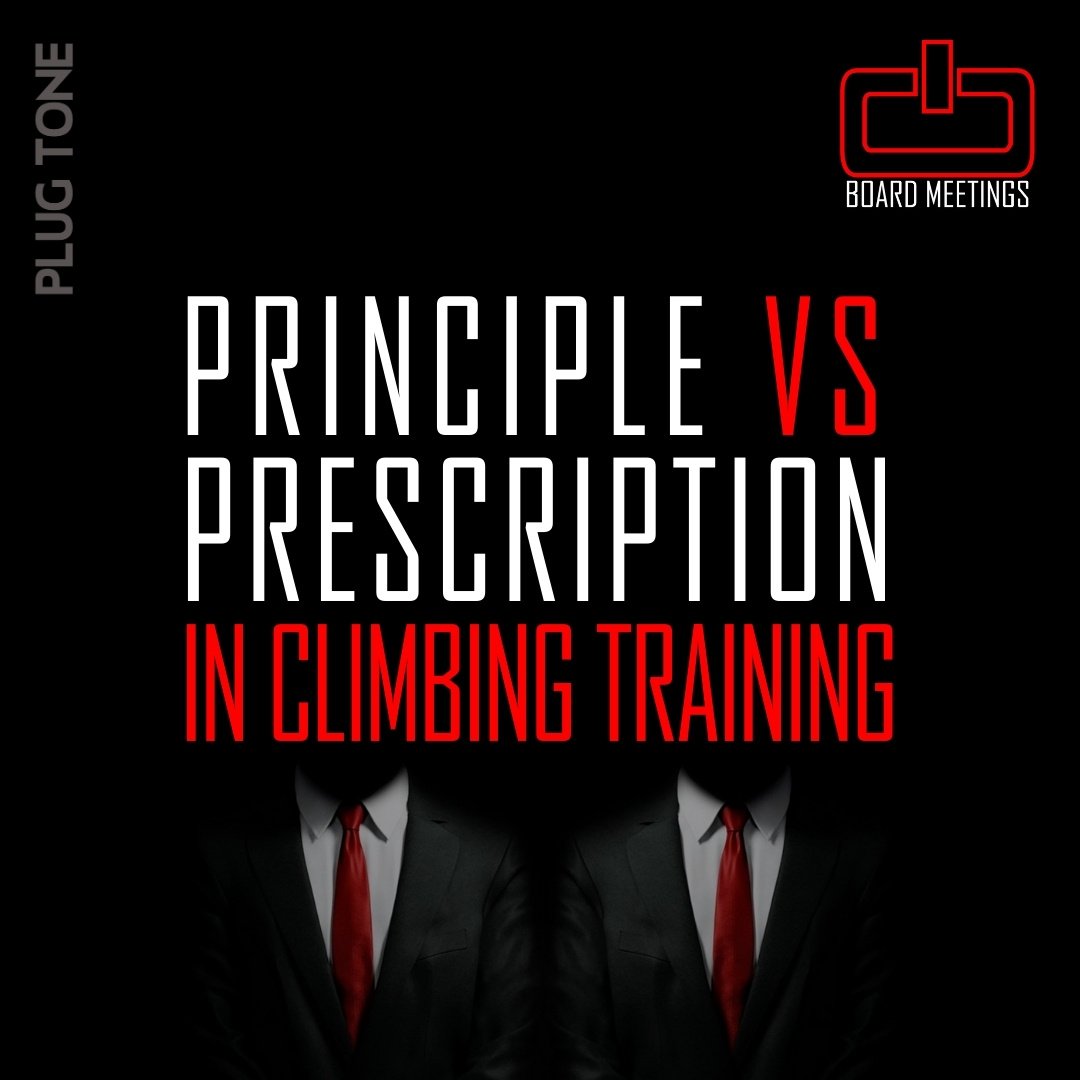
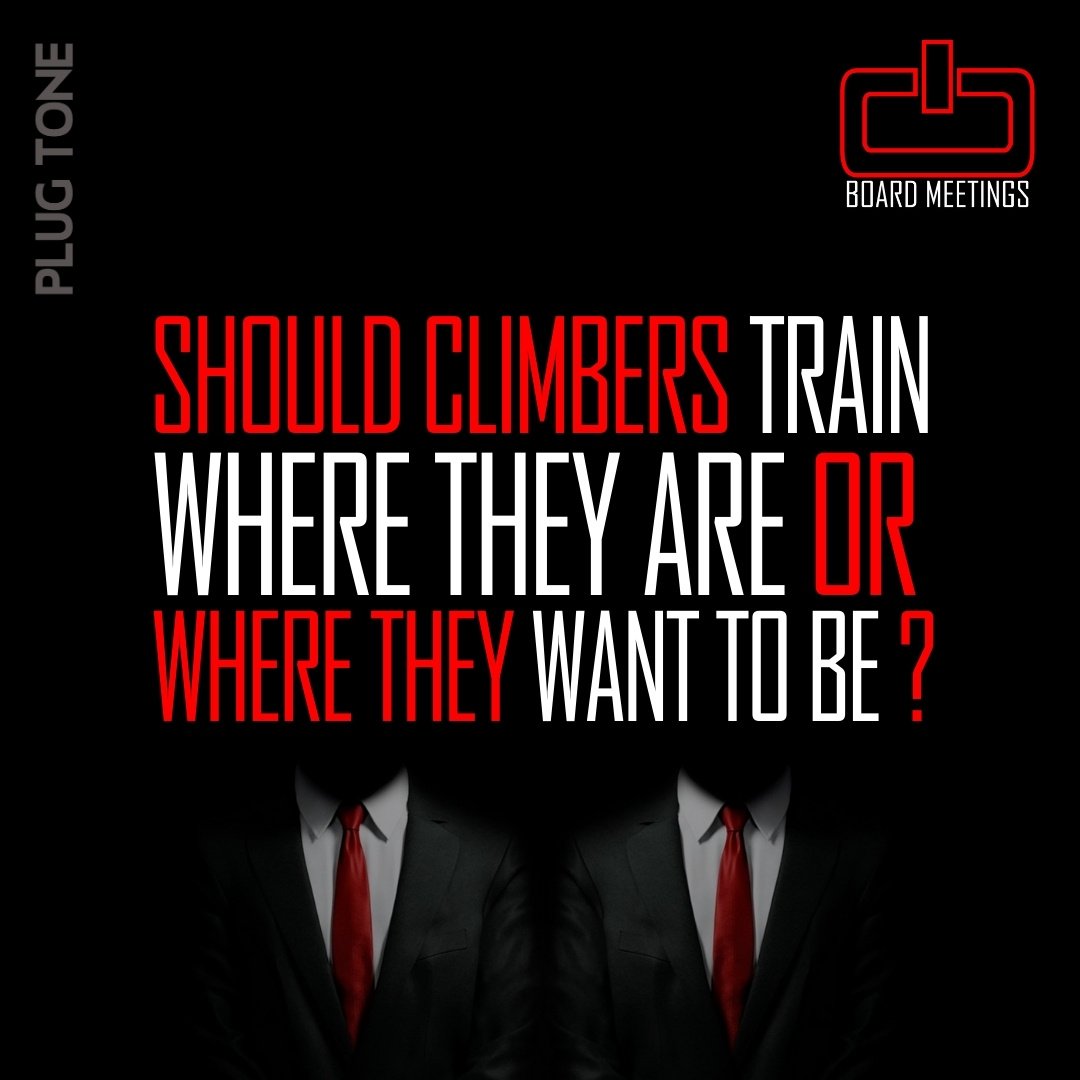
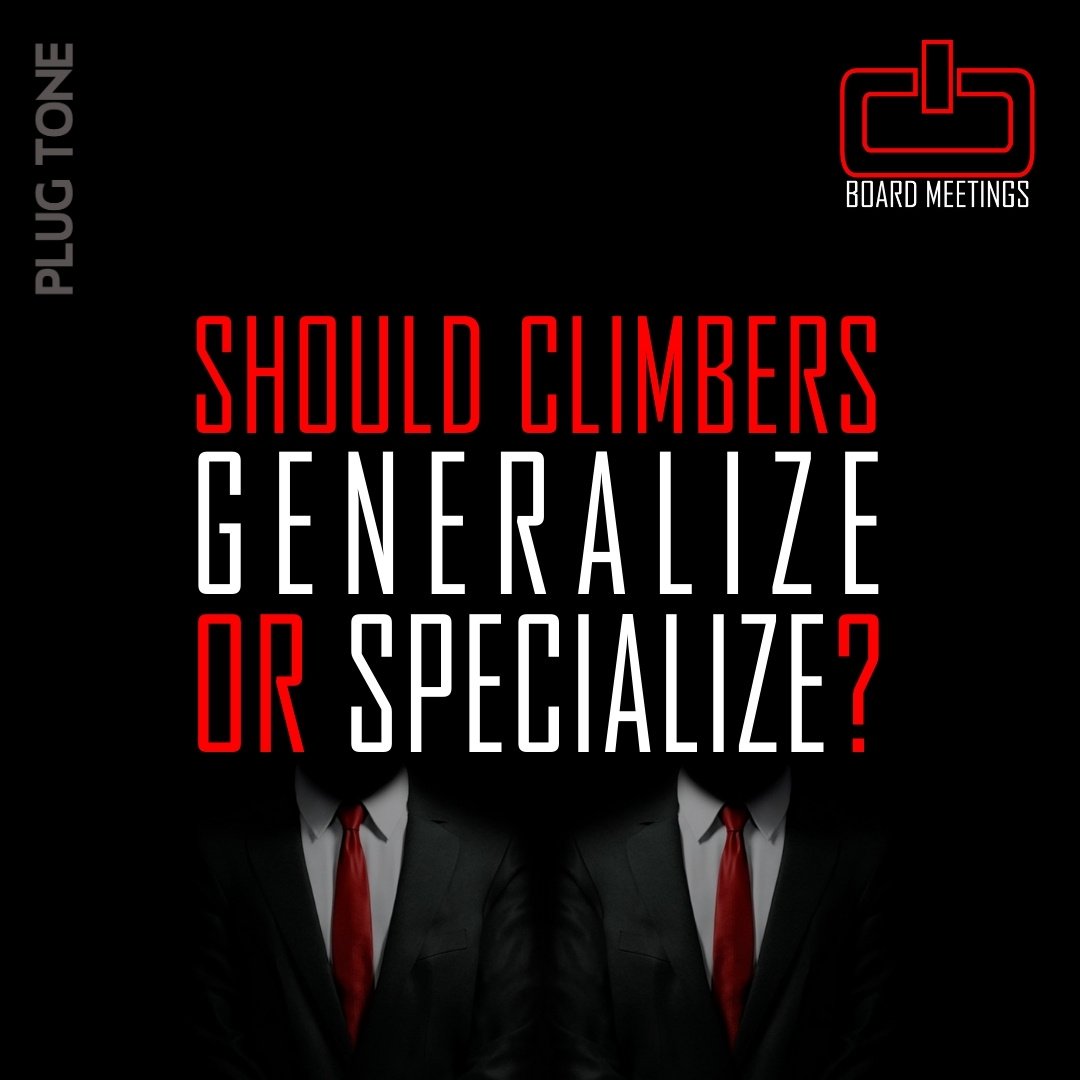

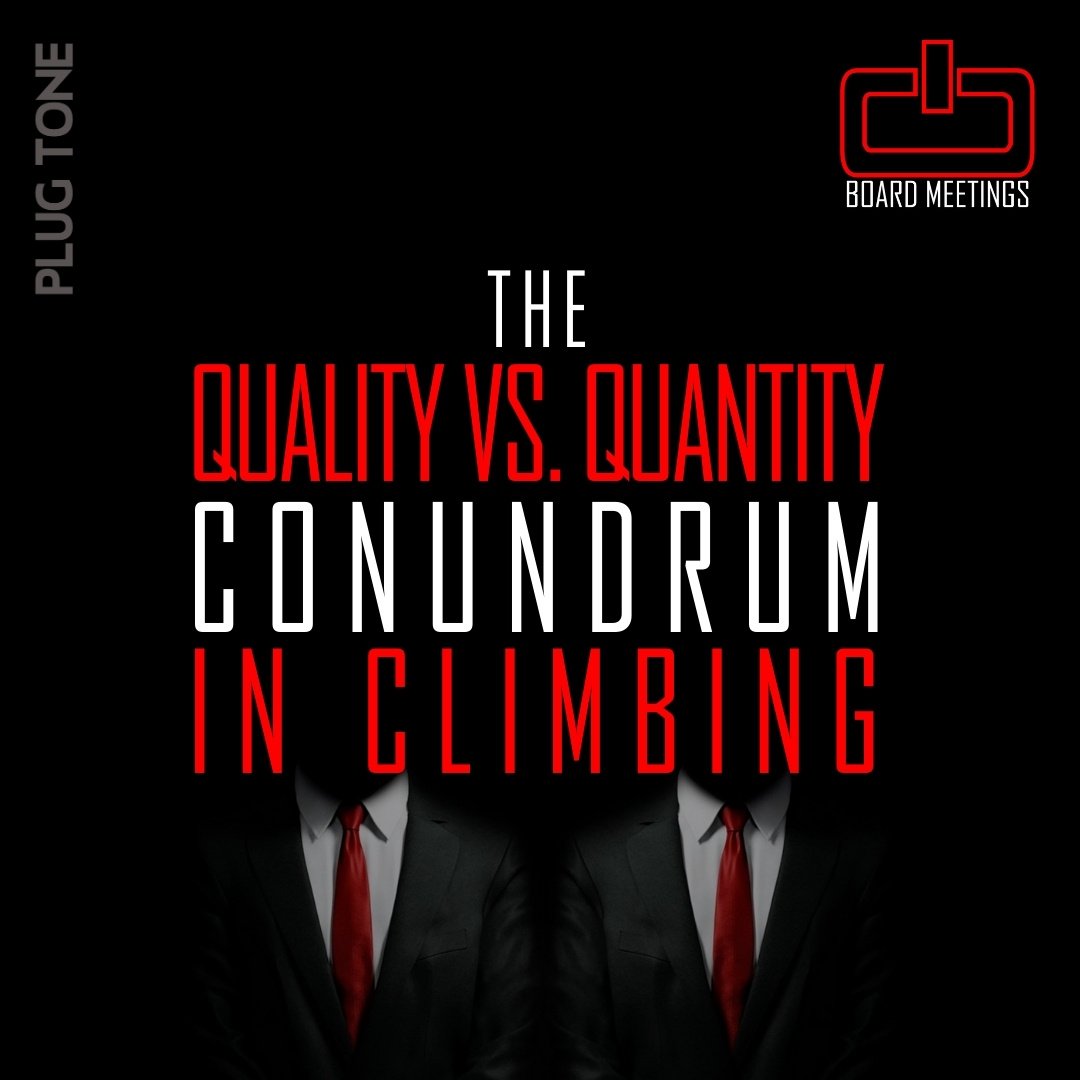
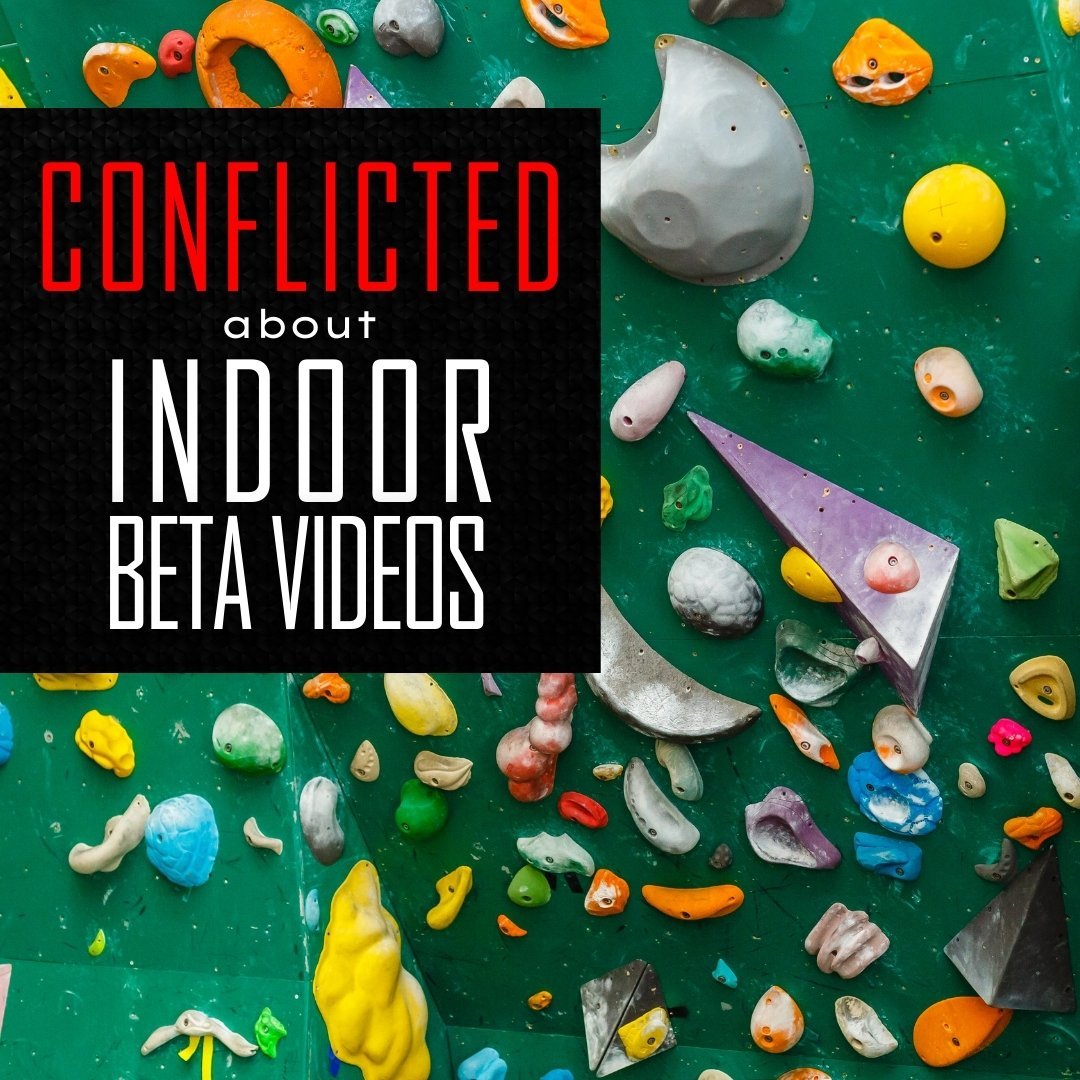
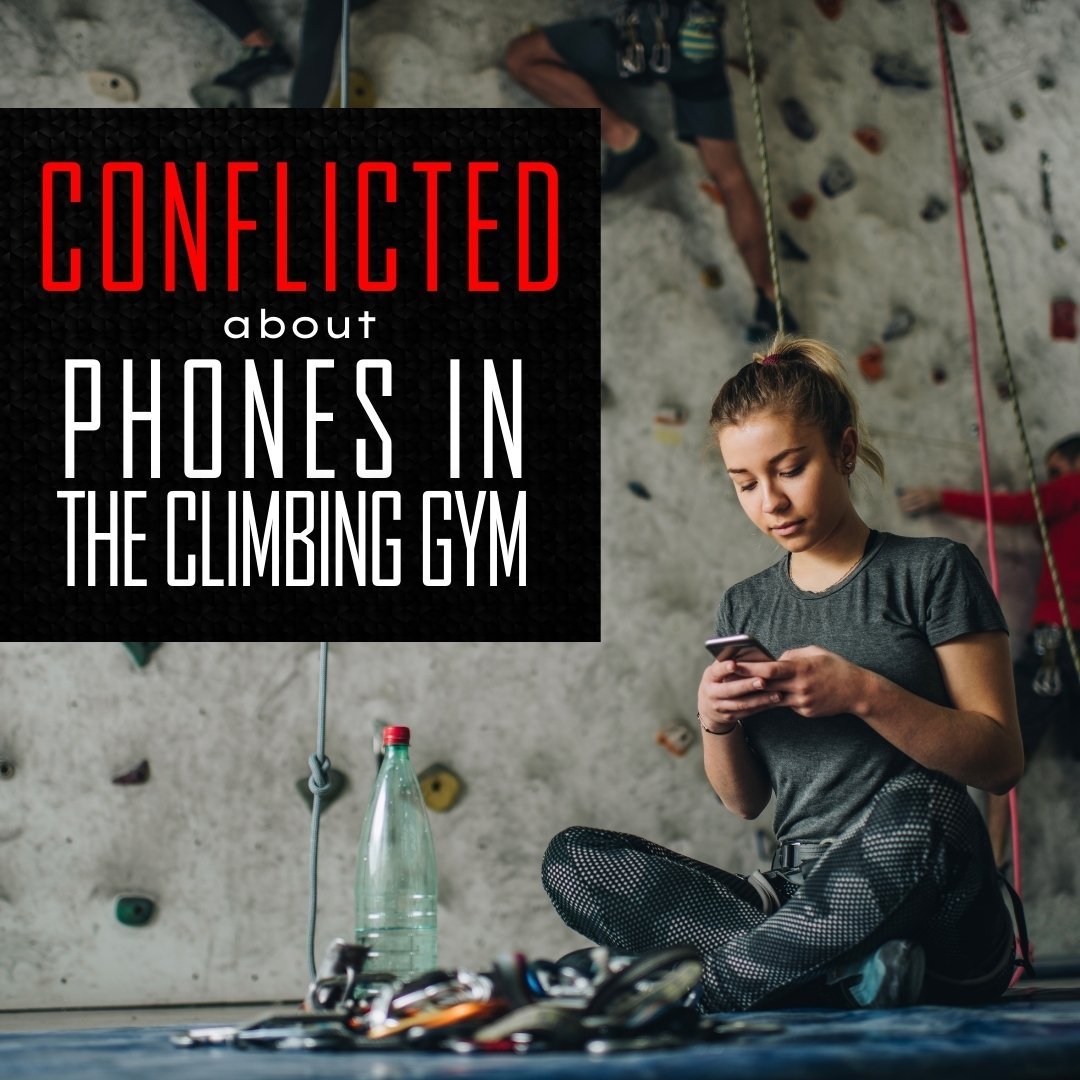
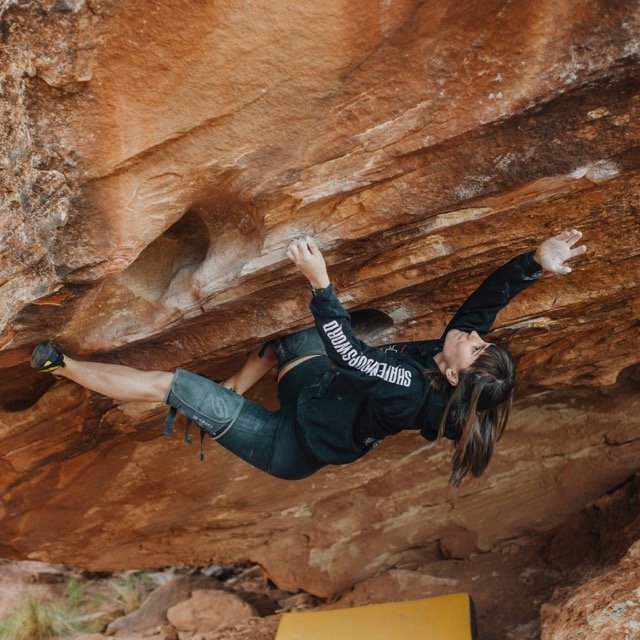

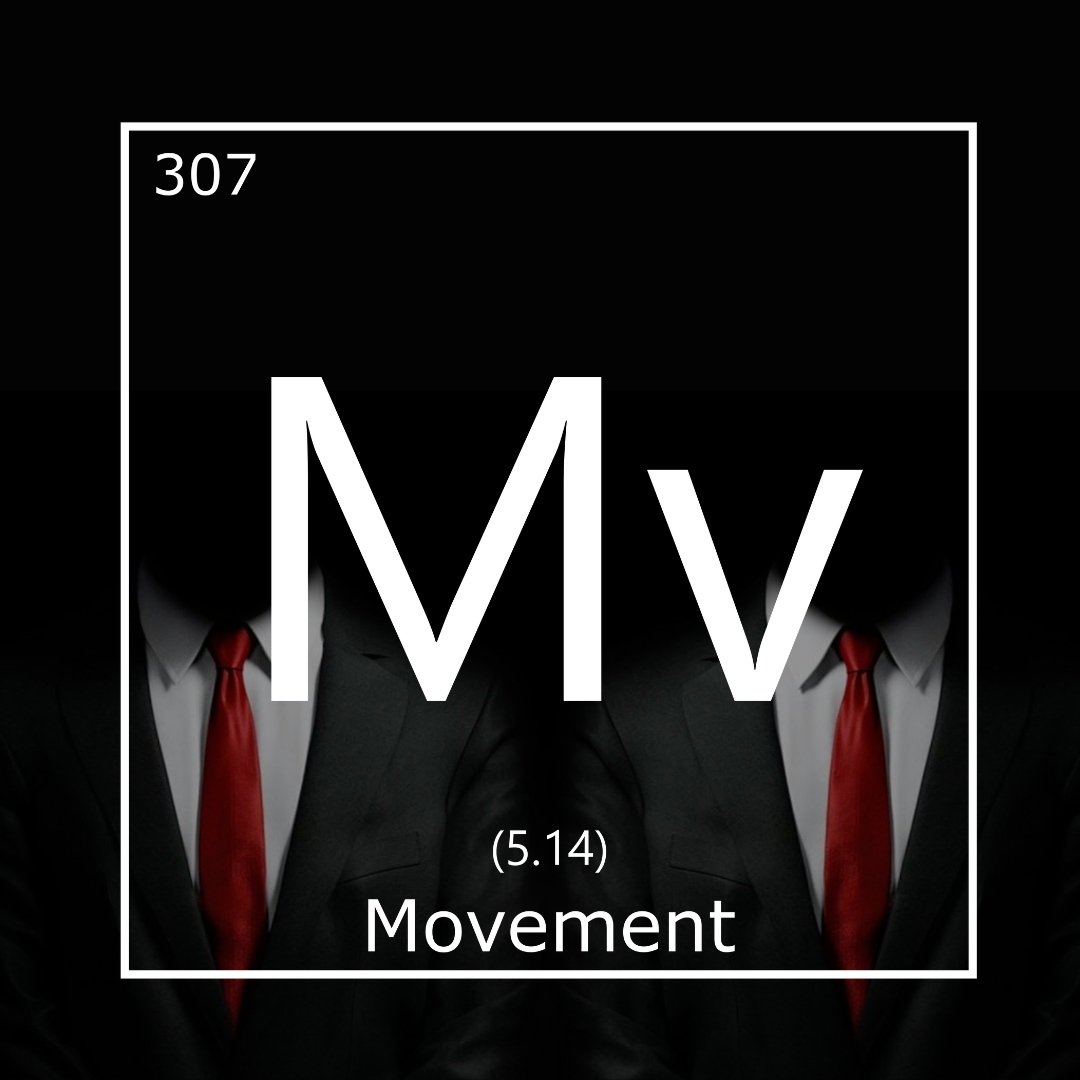
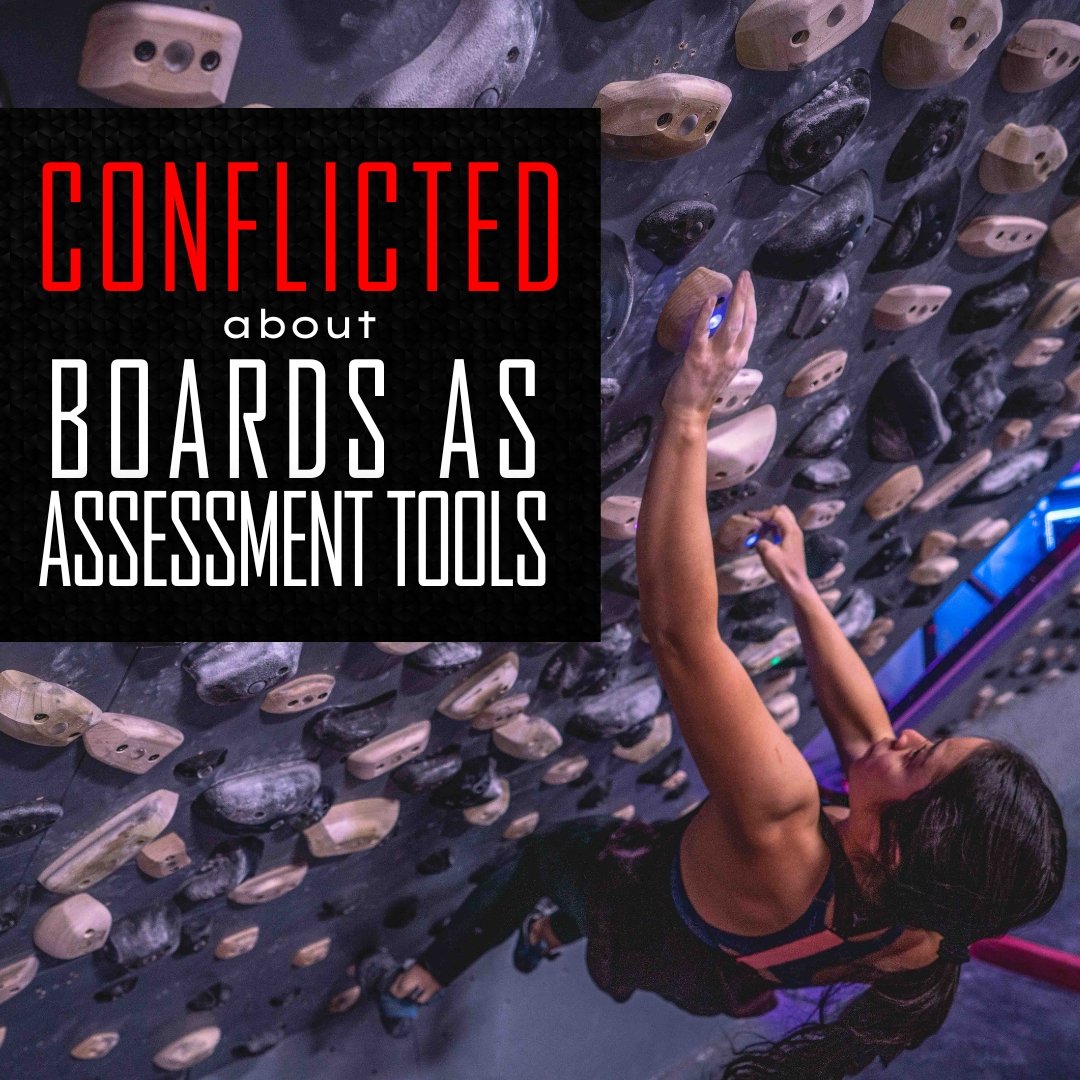
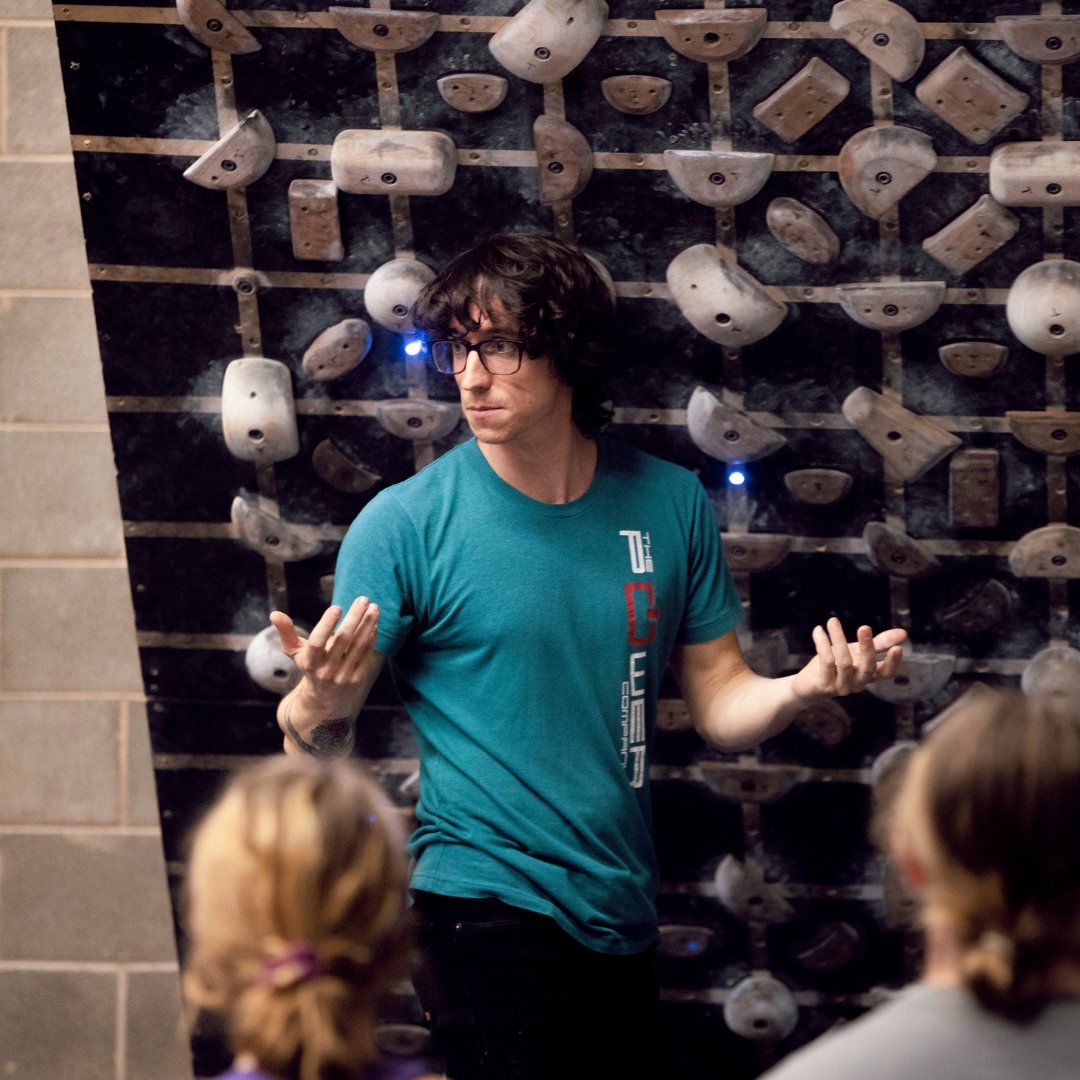
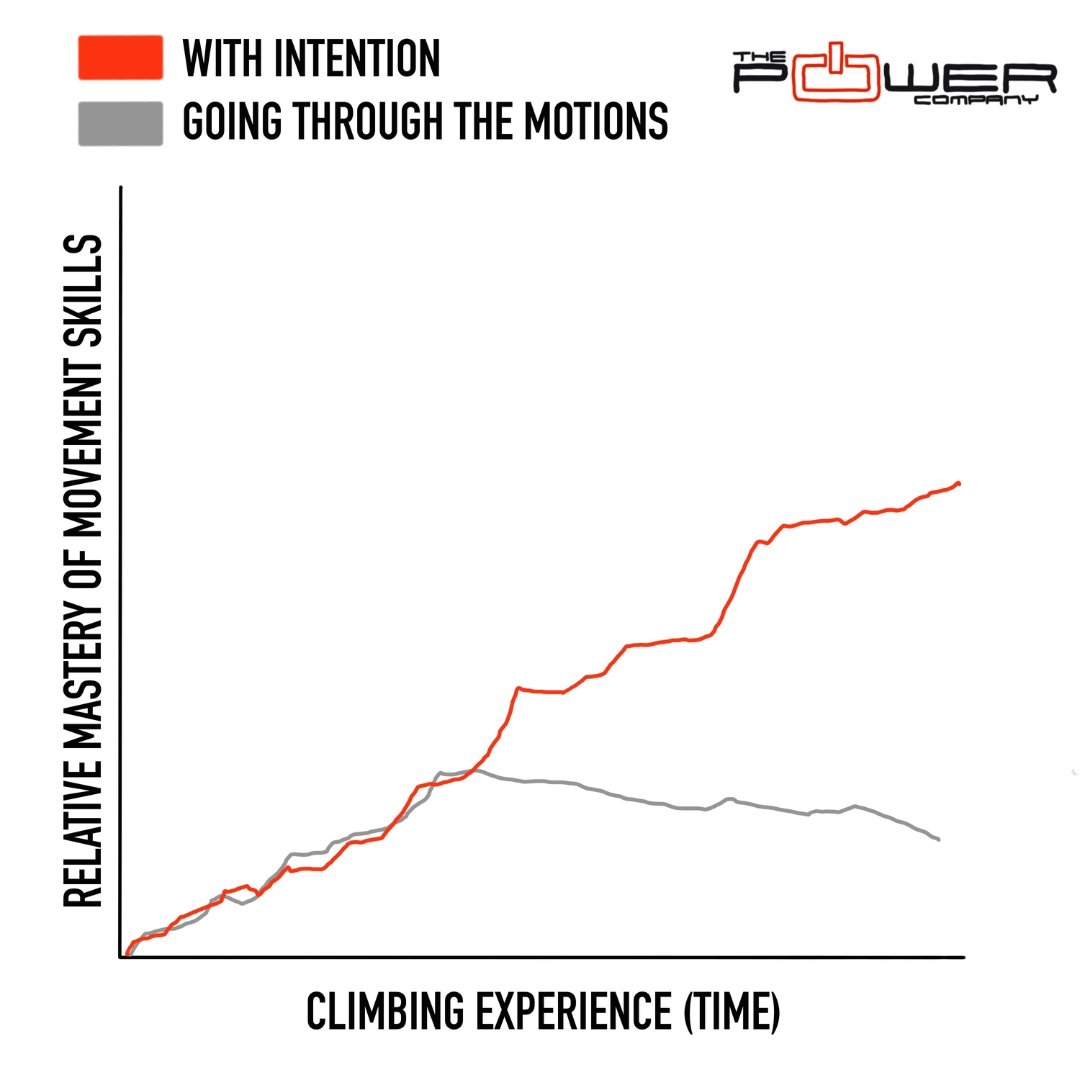




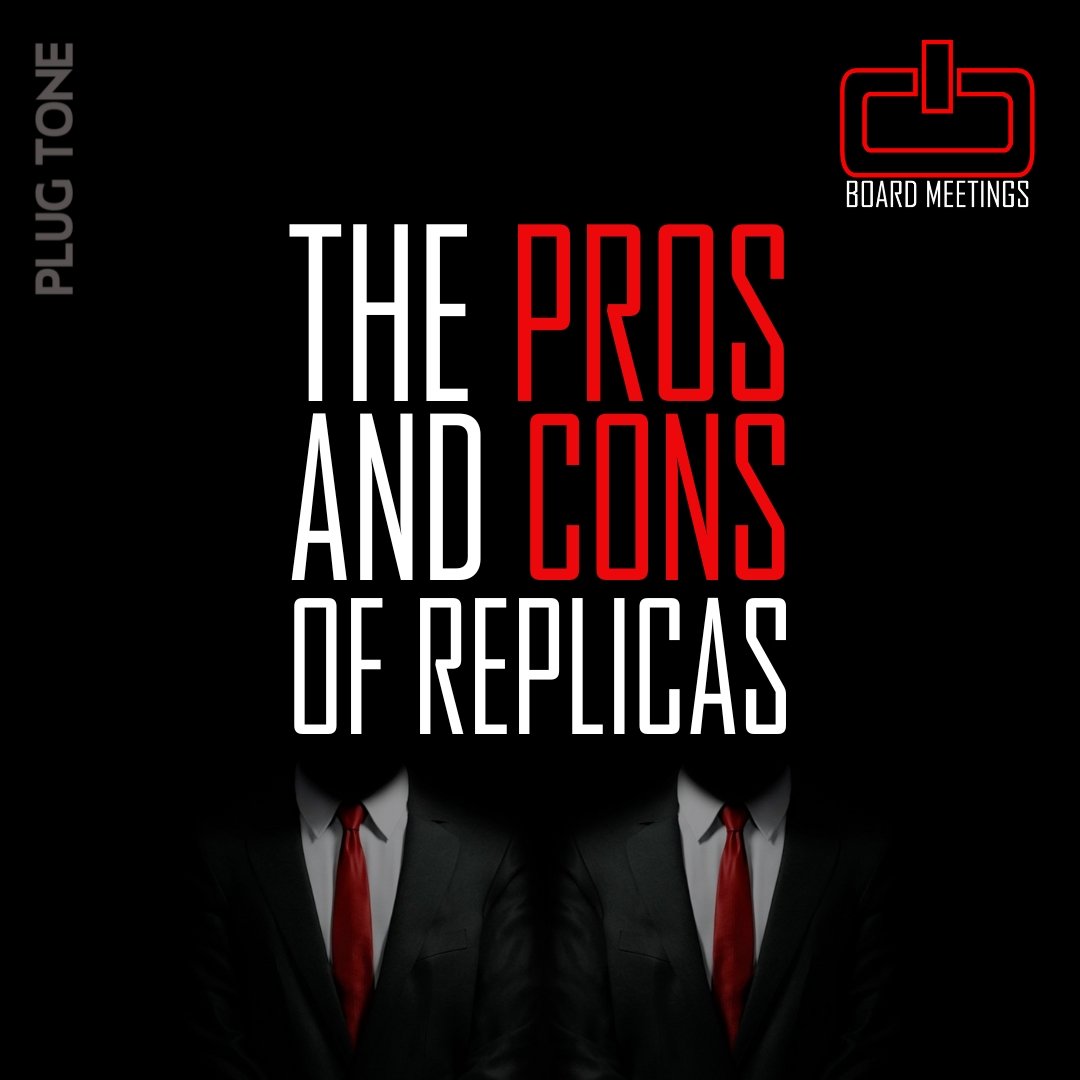


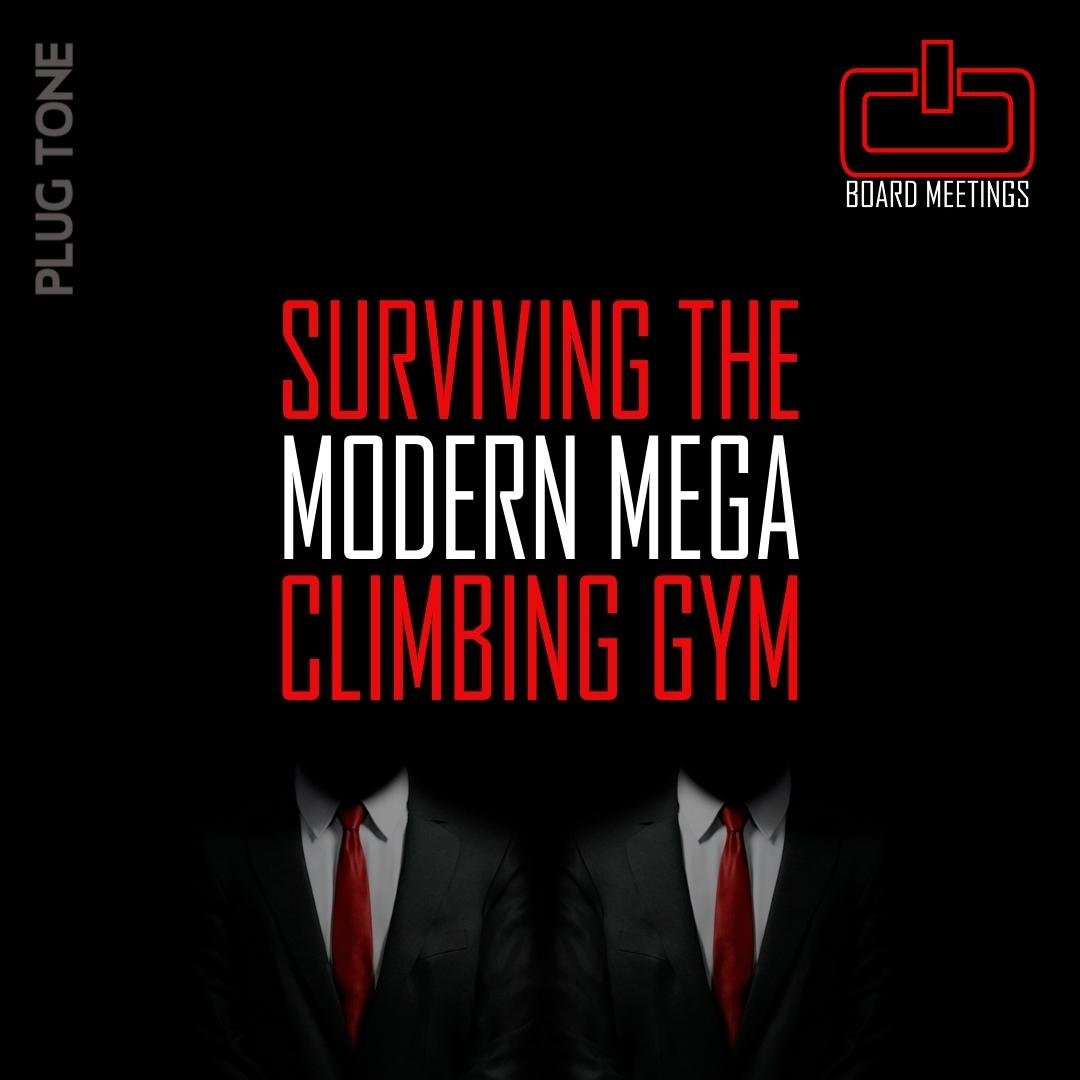


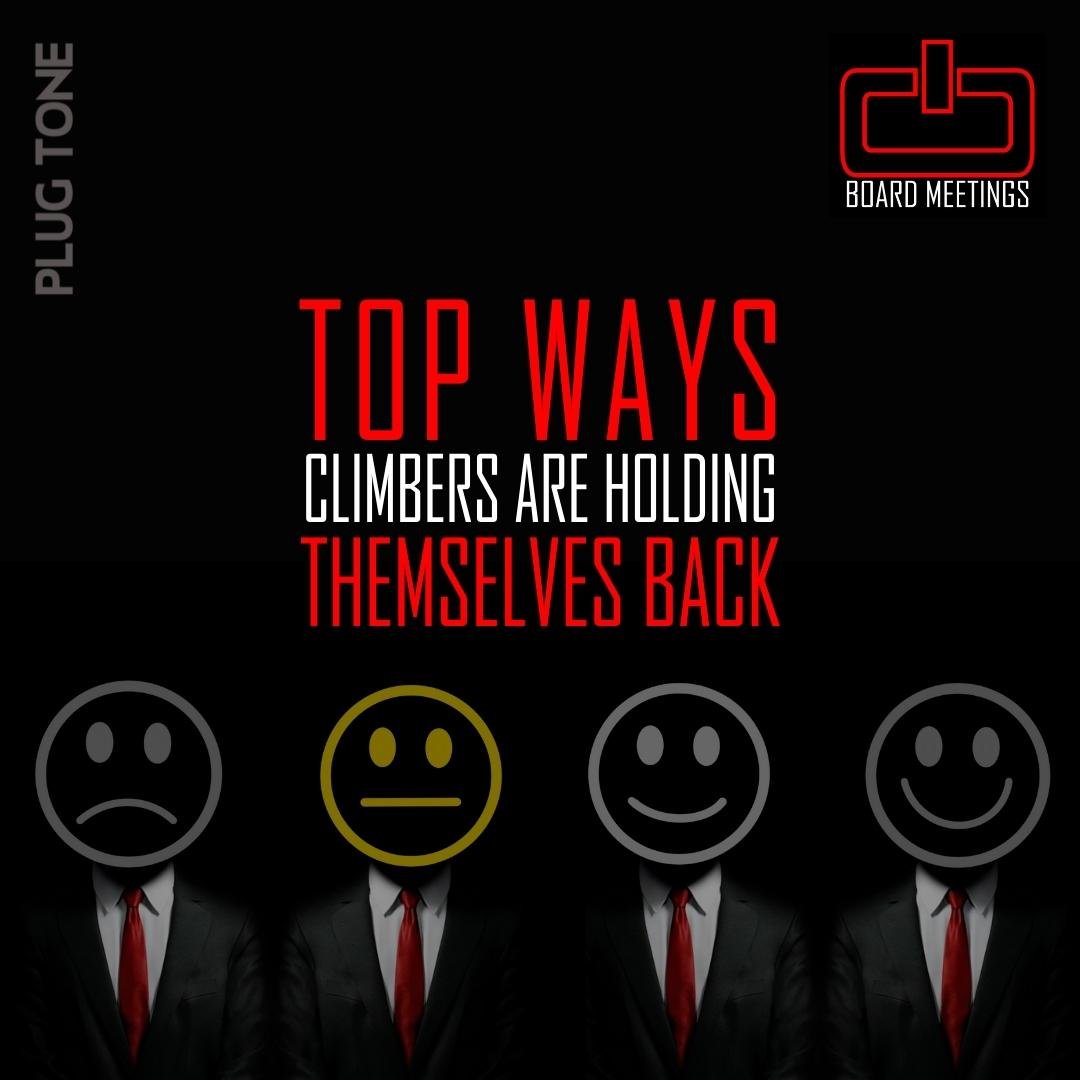




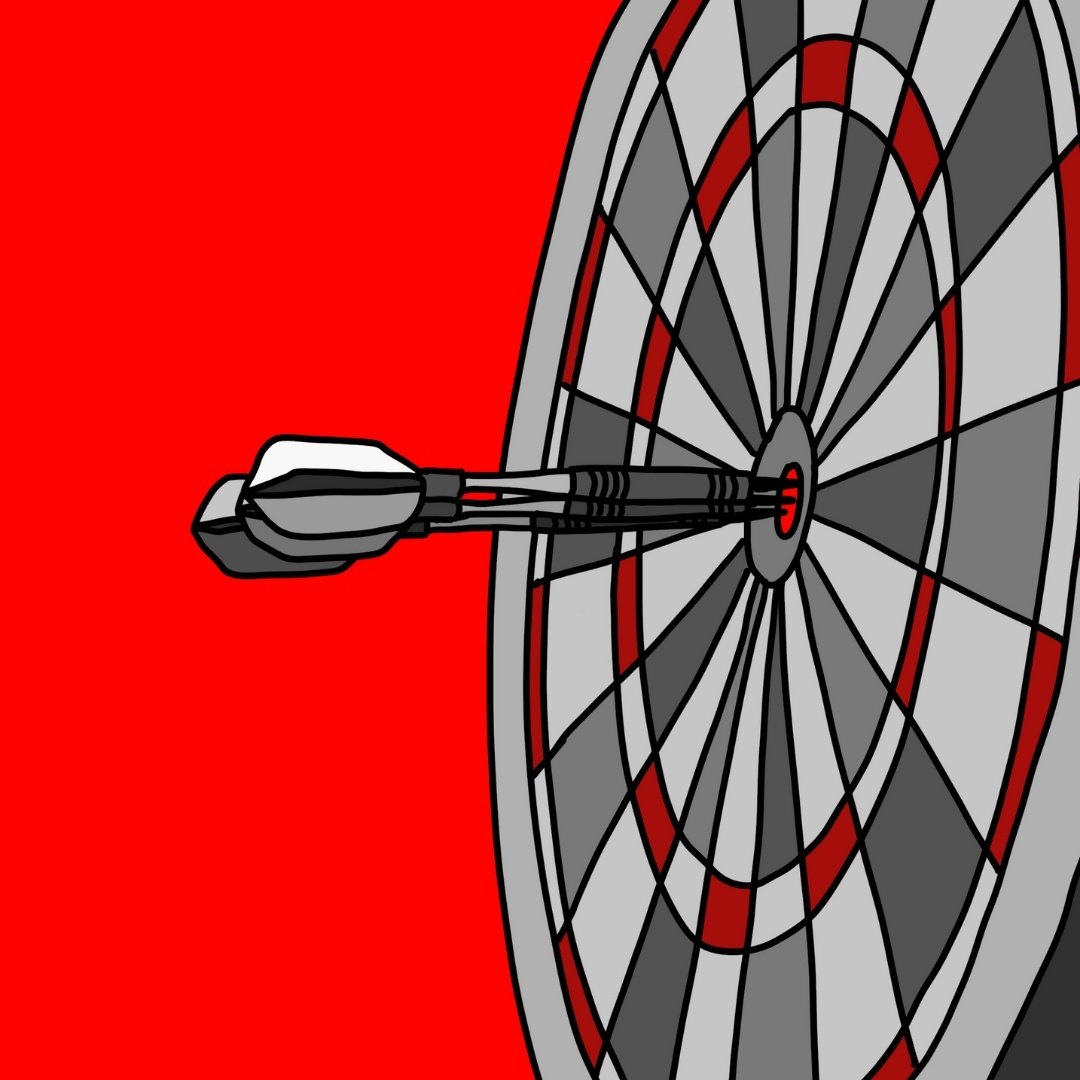


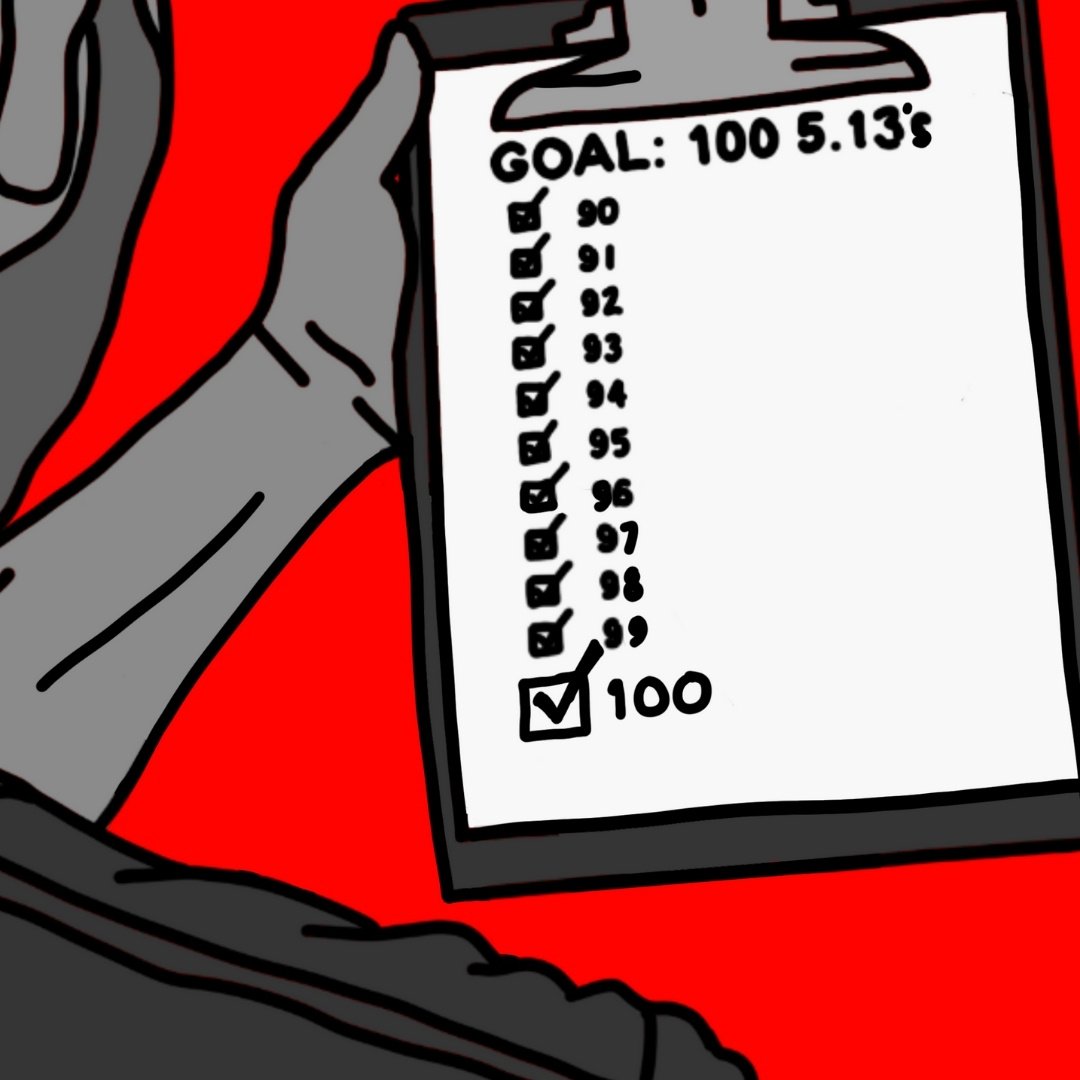
We are rarely in a position to take advantage of what we're physically capable of if we can’t shift our mindsets.